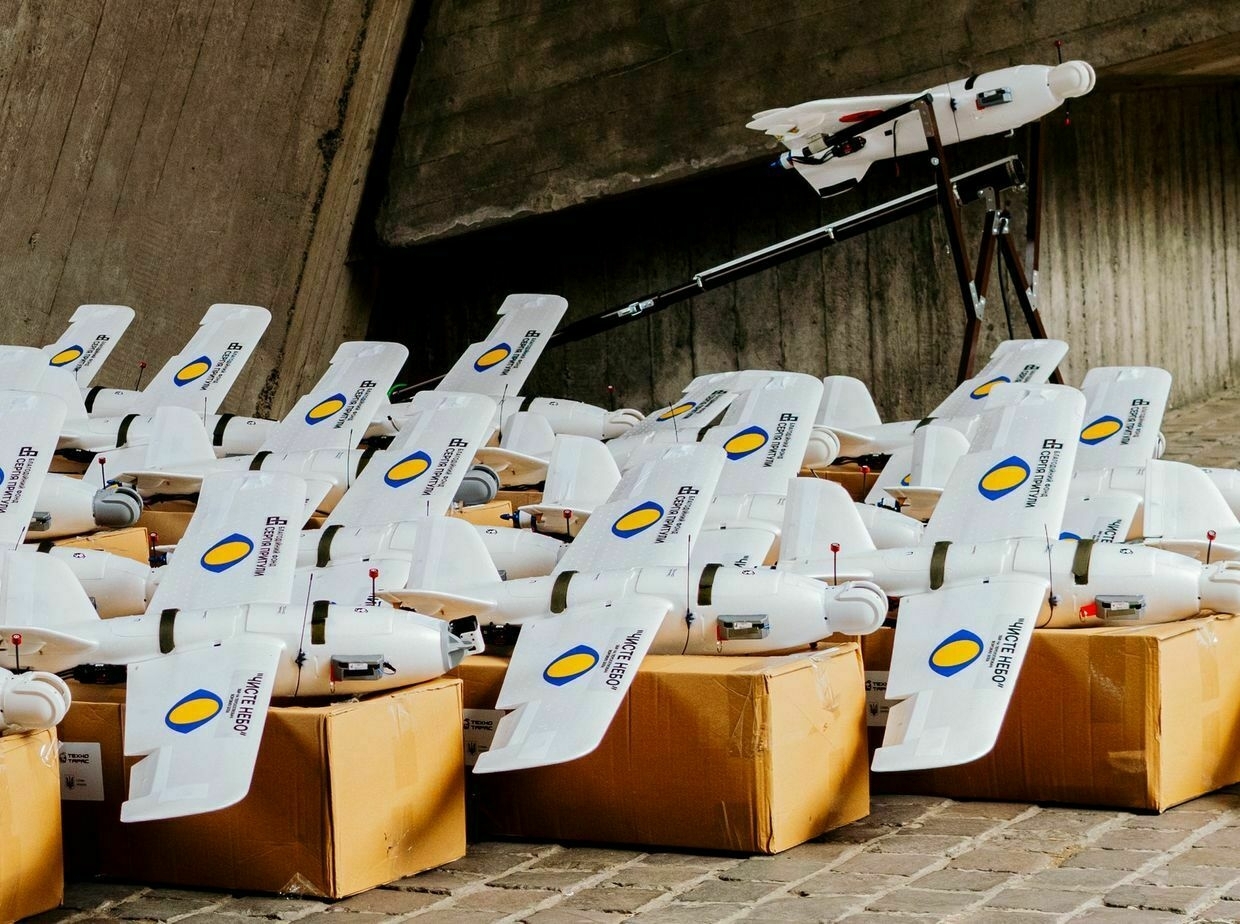-
Ukraine, US company to co-produce hundreds of thousands of drones in 2025, Zelensky announces
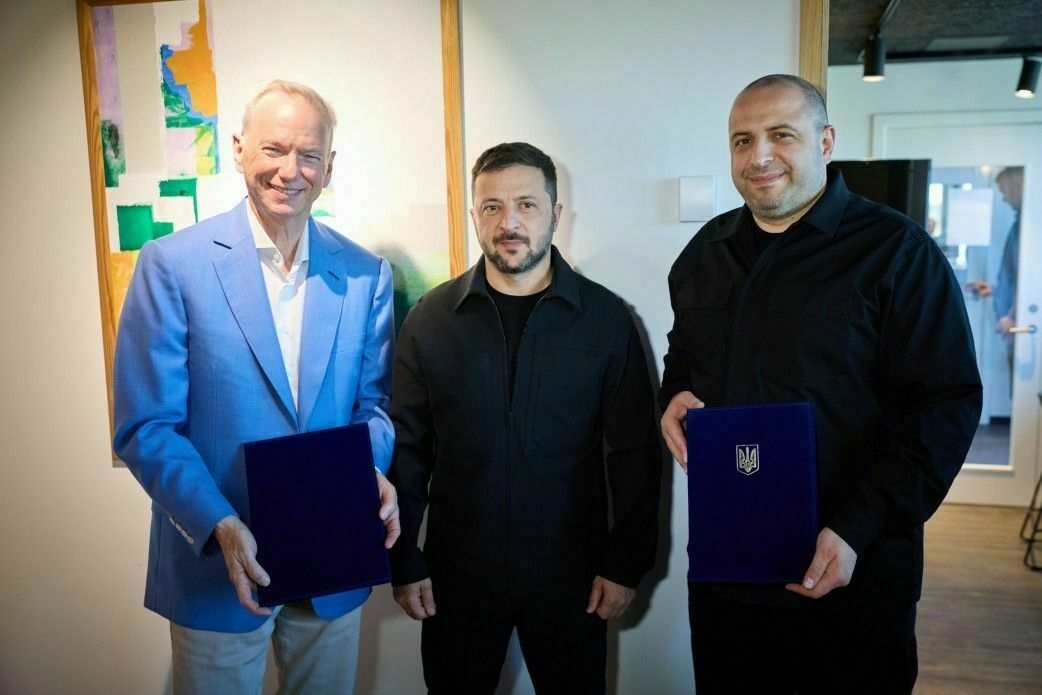
Ukraine signed a major deal with U.S. company Swift Beat to co-produce hundreds of thousands of drones this year, President Volodymyr Zelensky announced on July 3 during his visit to Denmark.
The long-term strategic partnership agreement was signed by Ukraine’s Defense Minister Rustem Umerov and Eric Schmidt, the CEO of Swift Beat, in Denmark on the same day.
Under the deal, the company will produce various kinds of unmanned aerial vehicles for Ukraine, including those designed to intercept Russian drones and missiles, reconnaissance, attack, and other drones, Zelensky said in a statement published on the website of the President’s Office.
“The key priority is interceptor drones that have already proven effective in Ukraine,” Zelensky said. “We’ve tested models from several companies, and now we’re signing serious contracts."
Swift Beat will increase its production capacity, aiming to produce hundreds of thousands of drones for Ukraine this year, with plans to scale up production in 2026, according to Zelensky.
“Modern drones will be supplied to Ukraine as a priority, on special terms and at cost,” Zelensky said.
The announcement comes just a day after the U.S. Defense Department (DOD) has halted shipments of some air defense missiles and other weapons previously promised to Kyiv. Ukraine has been trying to negotiate buying U.S. weapons for months after U.S. President Donald Trump, who has opposed military aid to Kyiv, took office in January.
Swift Beat has a significant presence in Ukraine, according to Zelensky's office. It specializes in autonomous AI-powered drones and cooperates with Ukrainian engineers and the military, conducting drone testing on Ukrainian territory, the statement reads.
Zelensky arrived in Denmark on July 3 to mark the country's assumption of the rotating presidency of the Council of the European Union.
Zelensky also said that during his visit, he plans to raise the issue of political blockages hindering Ukraine's path to joining the European Union.
"We're ready to open three accession clusters and want to start with one now, in the very near future. But political blockages remain, purely political," he said.
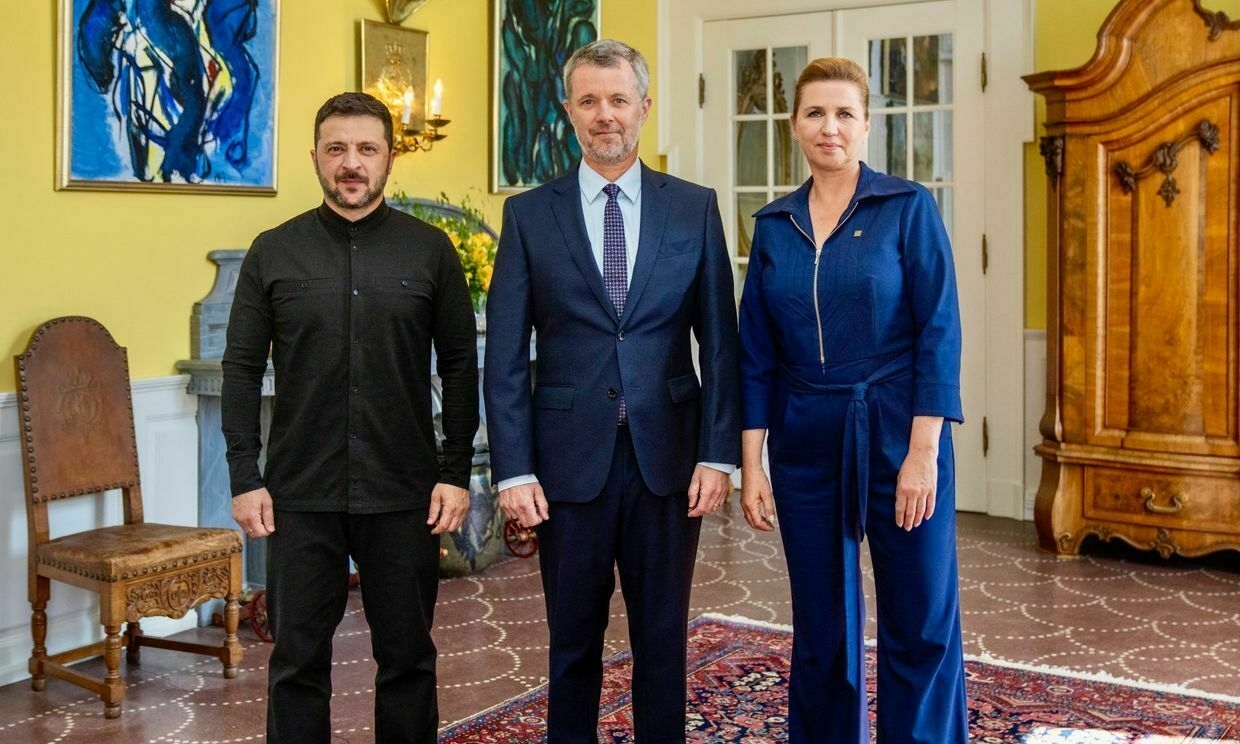
Denmark's King Frederik (C), President Volodymyr Zelensky (L), and Denmark's Prime Minister Mette Frederiksen (R) in Aarhus, Denmark, on July 3, 2025. (Ida Marie Odgaard / Ritzau Scanpix / AFP) While EU member states agreed to take into account the European Commission's assessment that Ukraine is ready to open the first, Fundamentals cluster, the process remains stalled due to Hungary's refusal to grant unanimous support.
Ukraine applied for EU membership in 2022 and was granted candidate status shortly thereafter, but full negotiations require the approval of all 27 EU member states.
Denmark has been a key backer of Ukraine since the start of Russia's full-scale invasion in 2022. In February 2024, Copenhagen signed a 10-year bilateral security agreement with Kyiv, pledging long-term defense cooperation until Ukraine secures NATO membership.
Zelensky said he expects Denmark to expand its financial support for Ukraine's drone and missile production initiatives.
"What we've just signed requires significant funding. I'm counting on our relationship with Denmark," the president said.
The Ukrainian president will also participate in official events commemorating Denmark's presidency of the Council. According to Danish broadcaster DR, the events will be attended by Denmark's royal family, government officials, and EU leaders.
‘One of Russia’s most critical targets’ — Ukraine confirms strike on missile battery plant in LipetskThe Energia plant in Yelets produces parts for ballistic and cruise missiles, as well as batteries for drones and glide bombs. The factory was previously targeted multiple times this past May.The Kyiv IndependentVolodymyr Ivanyshyn
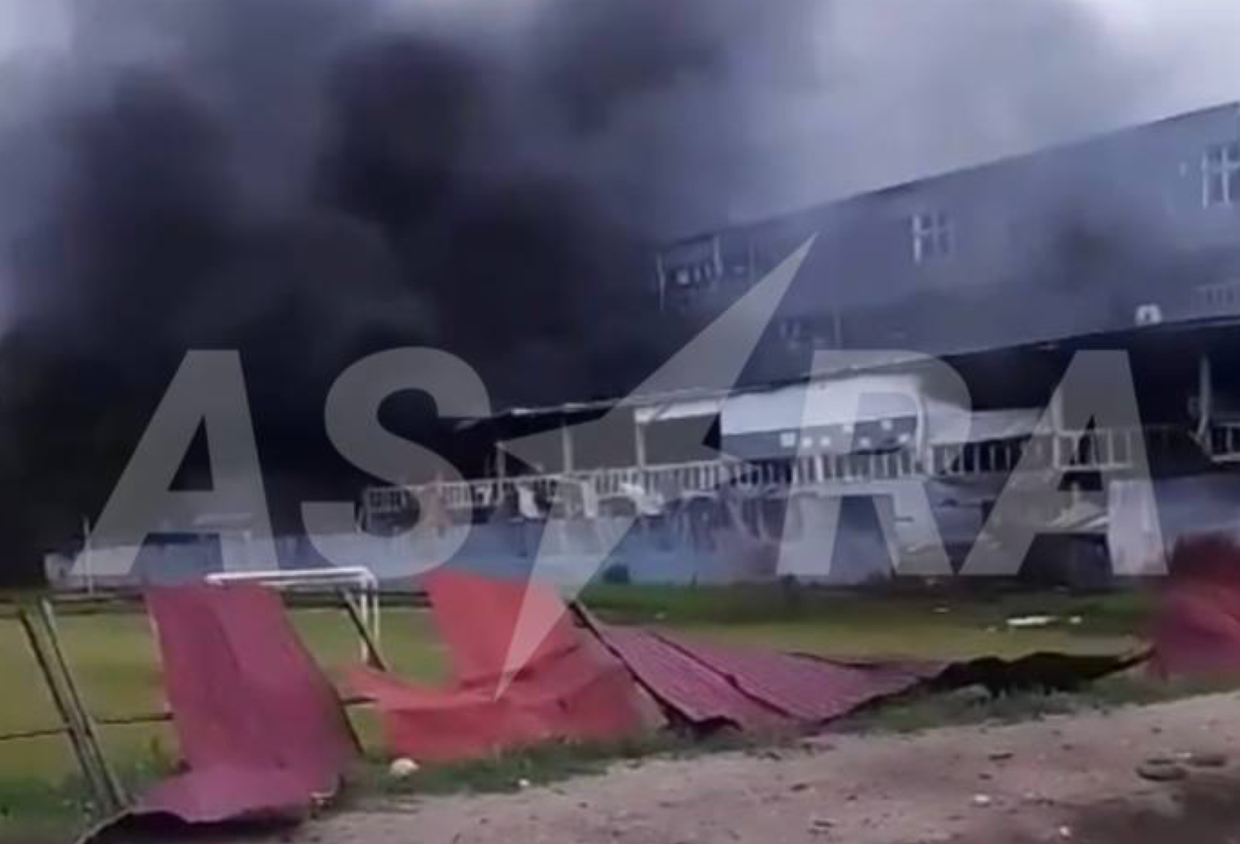
-
Explosion reportedly kills former Russian proxy mayor in occupied Luhansk
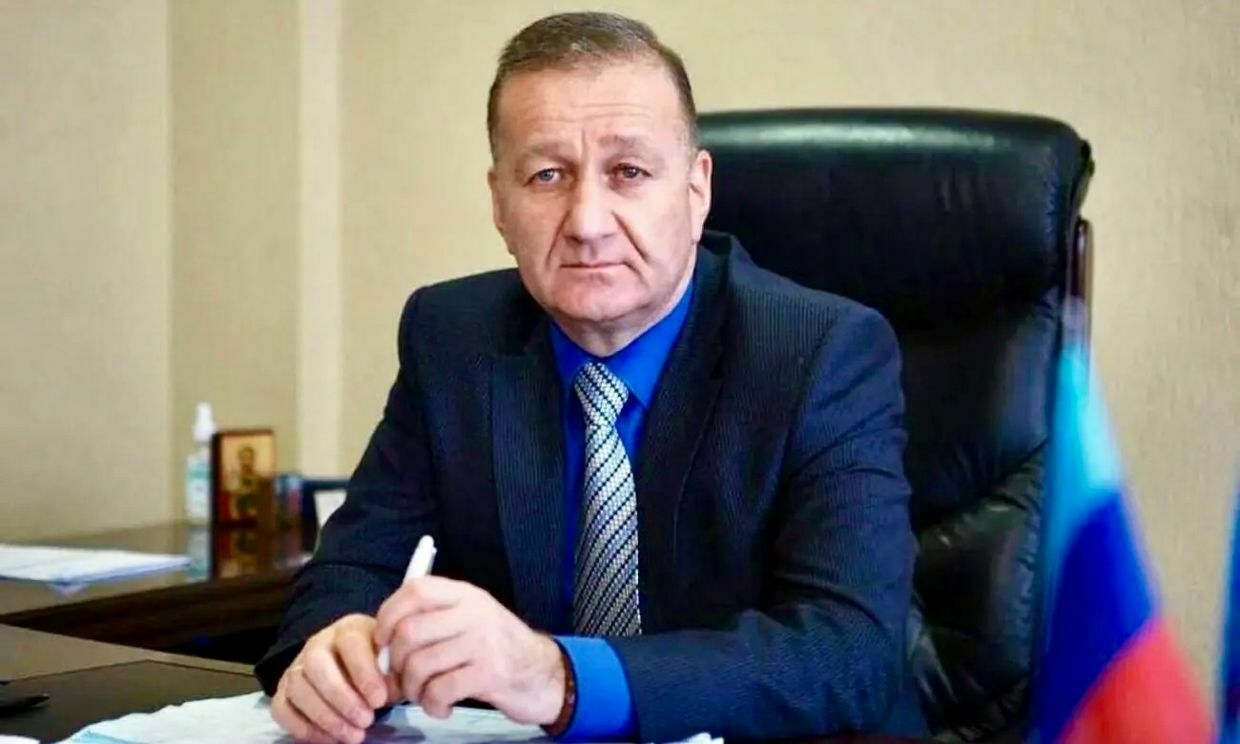
A midday explosion in the center of Russian-occupied Luhansk killed Manolis Pilavov, the city’s former Russian-installed mayor, Russian state news agency TASS reported on July 3.
Pilavov headed the occupation administration of Luhansk city from December 2014 until stepping down in November 2023. He had been wanted in Ukraine since 2015 on charges including attempting to violently overthrow the constitutional order and violating Ukraine’s territorial integrity.
The blast occurred around noon local time, according to TASS. Three people were reportedly injured, one of them in serious condition.
Ukraine has not commented on Pilavov’s reported death. Explosions targeting collaborators and occupation officials have become more frequent in recent months.
Pilavov, born in 1964, held several posts in the local Luhansk administration before Russia occupied parts of Ukraine’s eastern Luhansk Oblast in 2014.
He served as a city council member representing the now-banned pro-Russian Party of Regions and later actively supported the local Russian occupation administration.
Ukrainian authorities say Pilavov participated in separatist propaganda events and encouraged support for Moscow’s proxy occupation structures shortly after Russian-backed militants took control of parts of Luhansk Oblast in 2014.
Luhansk remains under Russian occupation, with its city center and government institutions controlled by Kremlin-installed proxies.
BREAKING: Deputy commander of Russian Navy killed in Ukrainian strike in Kursk, Russian official confirmsMajor General Mikhail Gudkov also led a brigade involved in combat operations against Ukraine. His death reportedly occurred during a Ukrainian attack on a Russian command post. The Kyiv IndependentAnna Fratsyvir
The Kyiv IndependentAnna Fratsyvir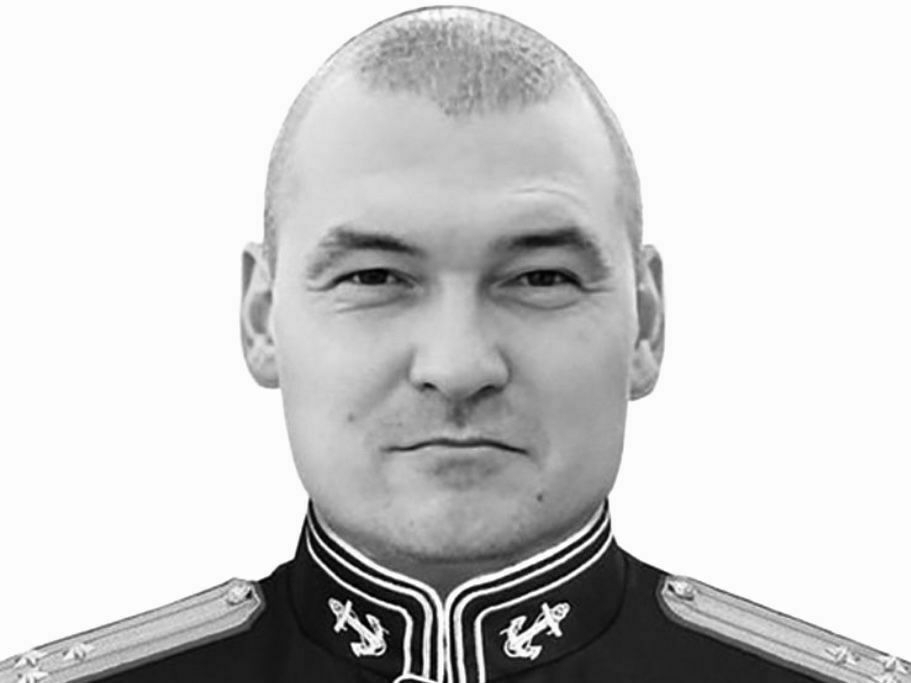
-
Ukrainian Air Force officer acting as 'FSB mole' arrested, SBU says
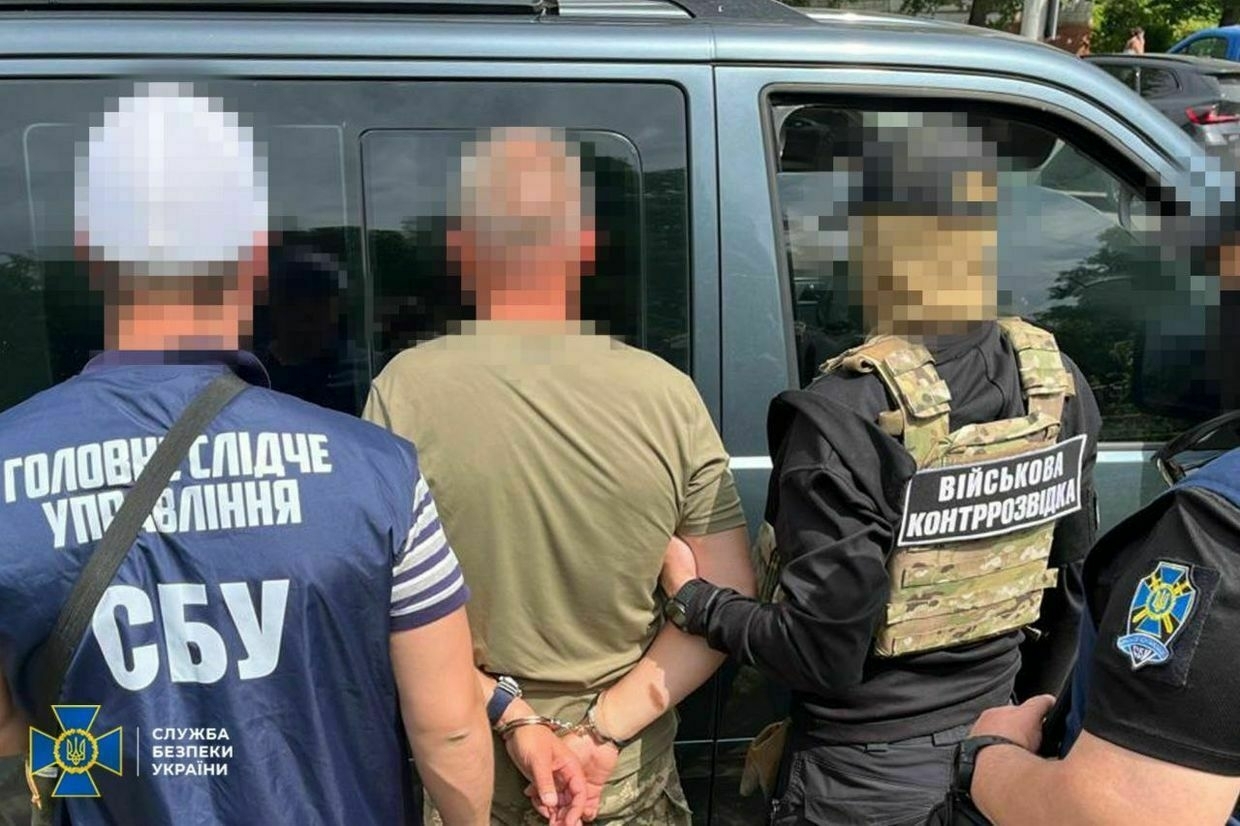
Ukraine’s Security Service (SBU) detained a Ukrainian Air Force major suspected of spying for Russian Federal Security Service (FSB), the agency reported on July 3.
The alleged spy, arrested during a special operation in Lviv Oblast, was reportedly recruited through his ex-wife, a former military officer now cooperating with Russian forces in occupied Melitopol.
According to the SBU, the officer was gathering coordinates of operational airfields, logistics hubs, and maintenance centers used by Ukrainian combat aircraft. If successful, Russia intended to launch missile and drone strikes on those locations.
The SBU said the operation was coordinated with Ukraine’s Commander-in-Chief and that the agent was supervised by Aleksandr Belodedov, an officer in the FSB’s Alpha special operations unit.
Authorities said they intercepted the agent before any damage was done, documenting his communication with Russian intelligence and securing military sites at risk.
The suspect has been charged with high treason committed during wartime by a group of individuals under Ukraine’s Criminal Code. He remains in custody and faces life imprisonment with asset seizure.
His ex-wife was also charged in absentia for treason during wartime.
‘Major casualties among civilians’ — US freeze on air defense missiles is terrible news for UkraineThe halting of deliveries of air defense missiles from the U.S. will lead to“major casualties among civilians,” a deputy commander in Ukraine’s air defense told the Kyiv Independent. Politico reported on July 1 that the U.S. Defense Department (DOD) had halted shipments of some weapons previouslyThe Kyiv IndependentKollen Post
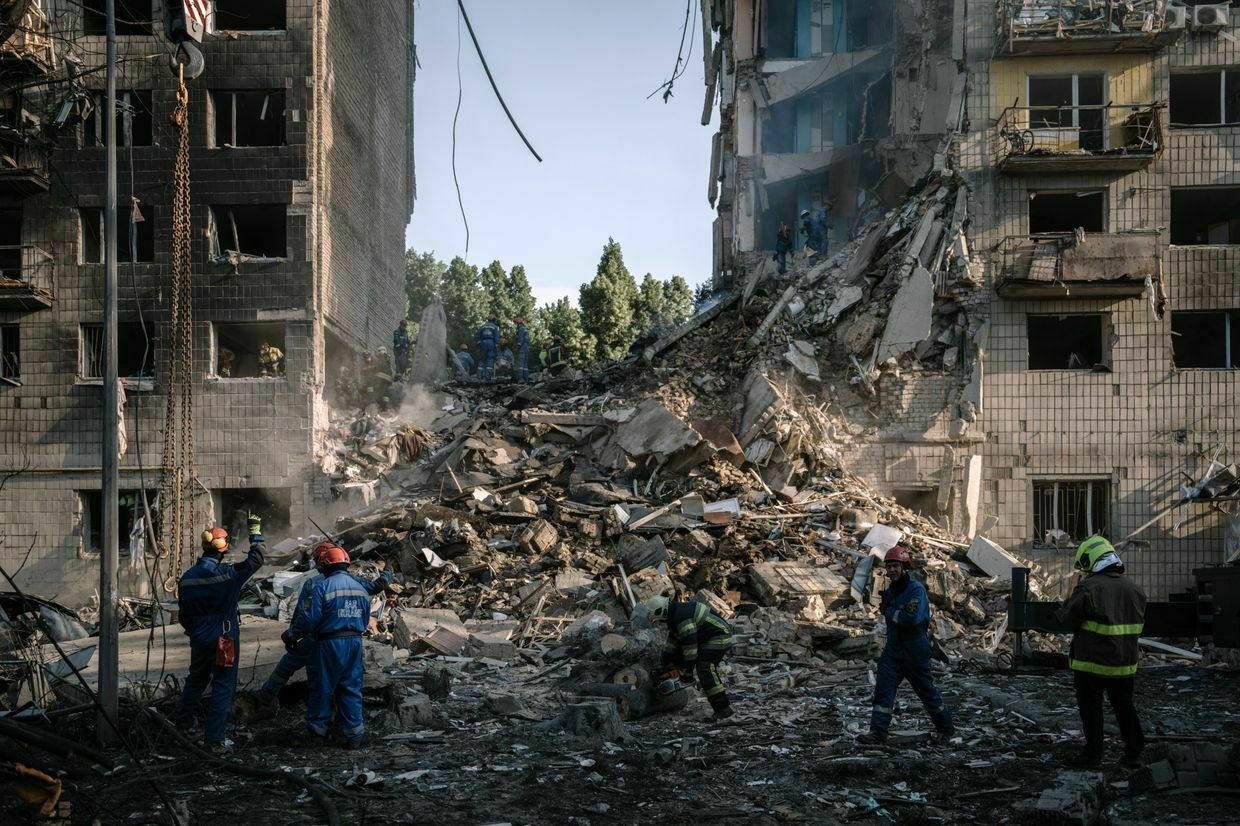
-
'A powerful secondary explosion' — Ukrainian drones destroy Russian ammunition depot in Donetsk Oblast, SBU says
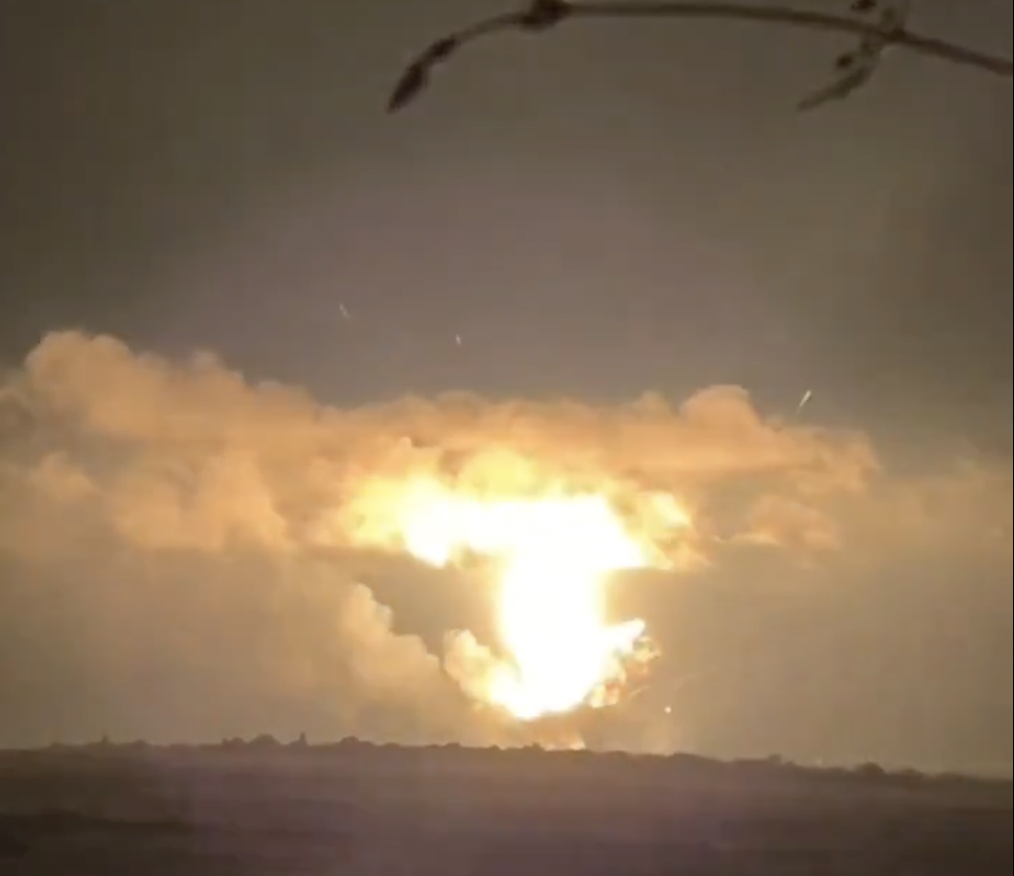
Ukrainian drones struck a Russian ammunition depot in occupied Donetsk Oblast overnight on July 3, setting off a series of huge explosions, Ukraine’s State Security Service said on July 3.
“Starting at 10 p.m., explosions rang out at the depots, followed by a powerful secondary detonation of ammunition and a fire,” the SBU said in a post on social media.
According to the SBU, the ammunition depot is located in the occupied Ukrainian city of Khartsyzsk, near Donetsk, which is “of important strategic importance, as it is used by the Russians as a rear base."
“The enemy has placed command posts, logistics centers, and ammunition depots there. All of them are legitimate military targets,” the statement added.
Unconfirmed videos posted to social media show a fire already burning followed by a large explosion and shockwave.
Meanwhile in Russian-occupied Khartsyzsk.
— Illia Ponomarenko 🇺🇦 (@IAPonomarenko) July 2, 2025
- 1 major Russian munitions depot. pic.twitter.com/uAhnqQONYwElsewhere on July 3, Ukraine confirmed strikes on the Energia factory in Russia's Lipetsk Oblast overnight, a facility that produces components for missiles and drones, including batteries for the Iskander missile system and cruise missiles.
Andrii Kovalenko, head of the Counter-Disinformation Center at Ukraine's National Security and Defense Council, confirmed the strike, calling Energia "one of the most critical targets for Russia."
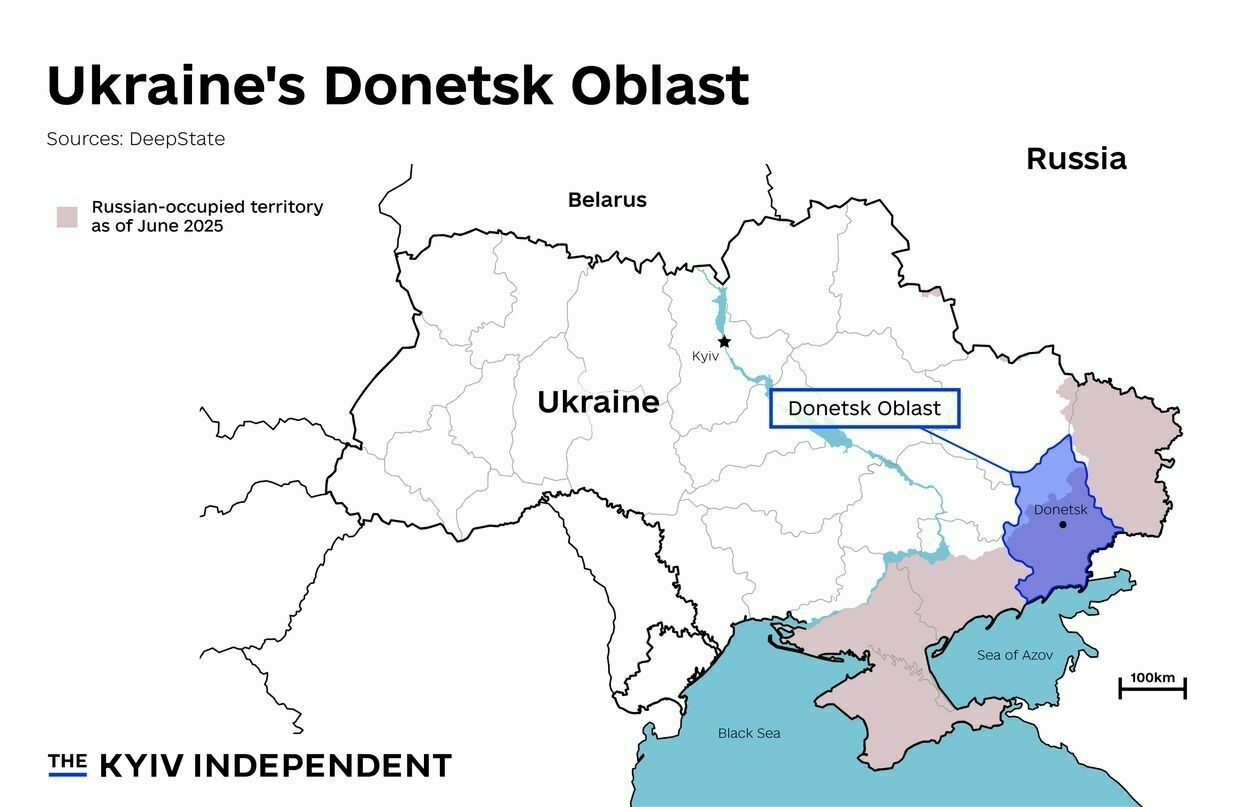
Ukraine's Donetsk Oblast (Nizar al-Rifai/The Kyiv Independent) According to Kovalenko, the facility manufactures batteries for missile guidance and glider modules, including for the Iskander system and cruise missiles.
Ukraine's military regularly strikes military targets in Russian-occupied territories and deep within Russia in an attempt to diminish Moscow's fighting power as it continues its war against Ukraine.
On the evening of June 30, Ukraine similarly struck a command post of the 8th Combined Arms Army of the Russian Armed Forces in the Russian-occupied part of Donetsk Oblast.
Russia has for months focused its offensive efforts on the embattled town of Pokrovsk in Donetsk Oblast and has recently been escalating attempts to break through to neighboring Dnipropetrovsk Oblast, a region that has not yet seen combat.
BREAKING: Deputy commander of Russian Navy killed in Ukrainian strike in Kursk, Russian official confirmsMajor General Mikhail Gudkov also led a brigade involved in combat operations against Ukraine. His death reportedly occurred during a Ukrainian attack on a Russian command post. The Kyiv IndependentAnna Fratsyvir
The Kyiv IndependentAnna Fratsyvir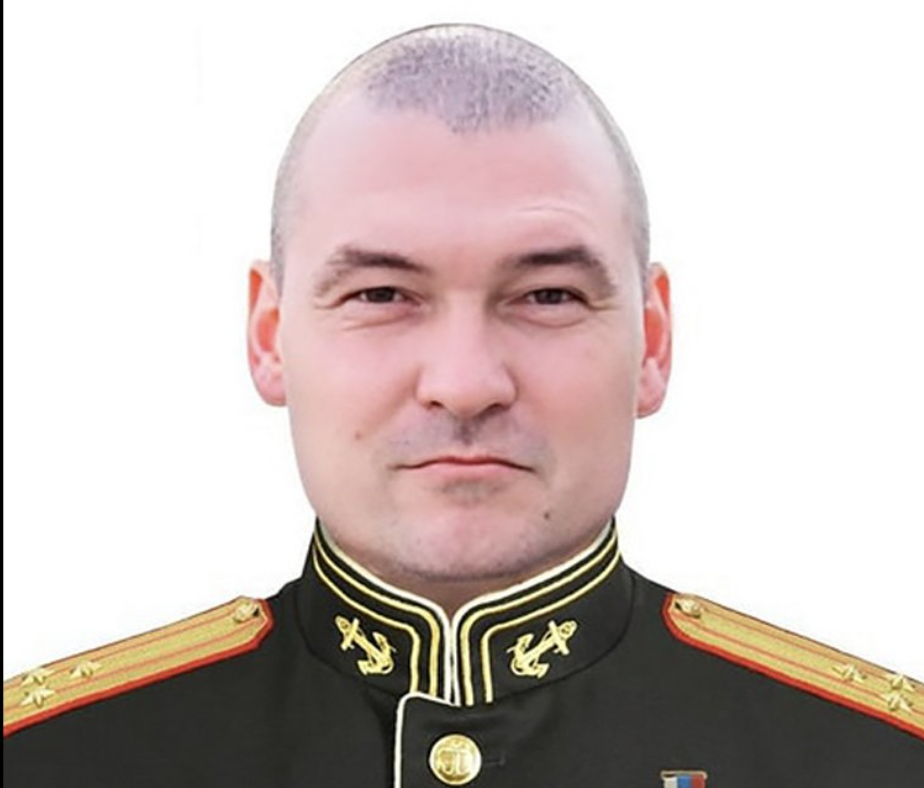
-
BREAKING: Deputy commander of Russian Navy killed in Ukrainian strike in Kursk, Russian official confirms
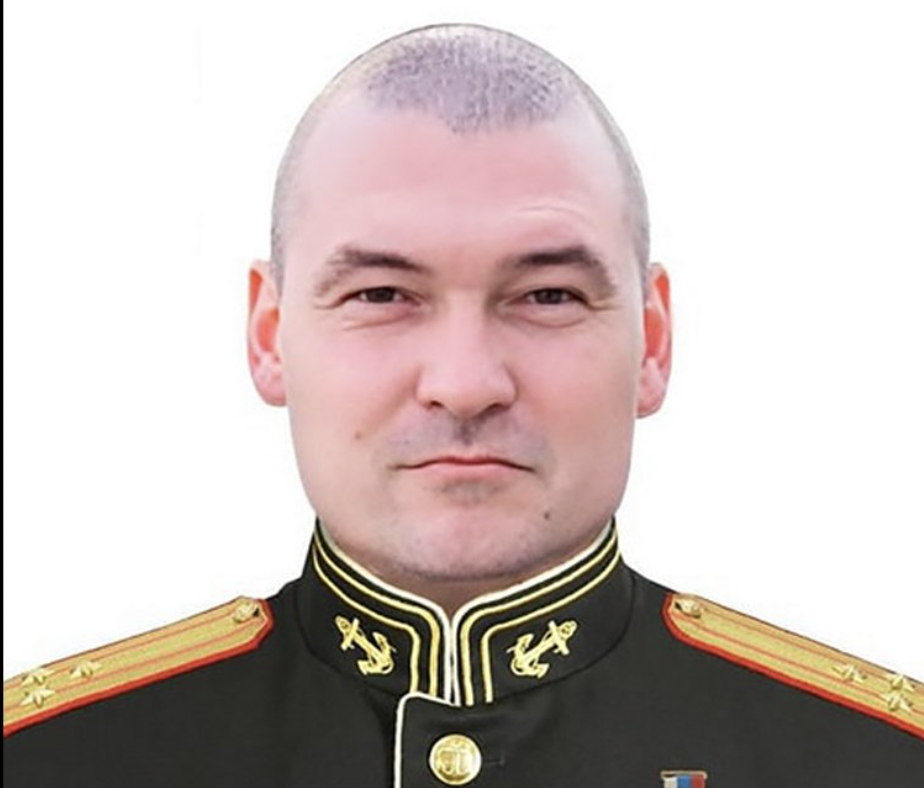
Editor’s note: This is a developing story and is being updated.
A high-ranking Russian naval officer Major General Mikhail Gudkov has been killed in a Ukrainian strike in Russia’s Kursk region, Oleg Kozhemyako, governor of Russia’s Primorsky Krai confirmed on July 3.
Gudkov, the deputy commander of the Russian Navy, was killed in the border district of Korenevo, according to Kozhemyako.
Gudkov also led a brigade involved in combat operations against Ukraine. His death reportedly occurred during a Ukrainian attack on a Russian command post.
Ukraine has not officially commented on the reports.
Arrests, raids, beaten and bloodied suspects — how Russia-Azerbaijan relations have unravelledDeaths in custody, media offices raided, and beaten and bloodied suspects paraded in court — relations between Russia and Azerbaijan, once considered close, have sharply deteriorated in recent days amid a series of high-profile incidents. The latest tensions erupted over the weekend when Russian law enforcement officers detained over 50 AzerbaijaniThe Kyiv IndependentTim Zadorozhnyy
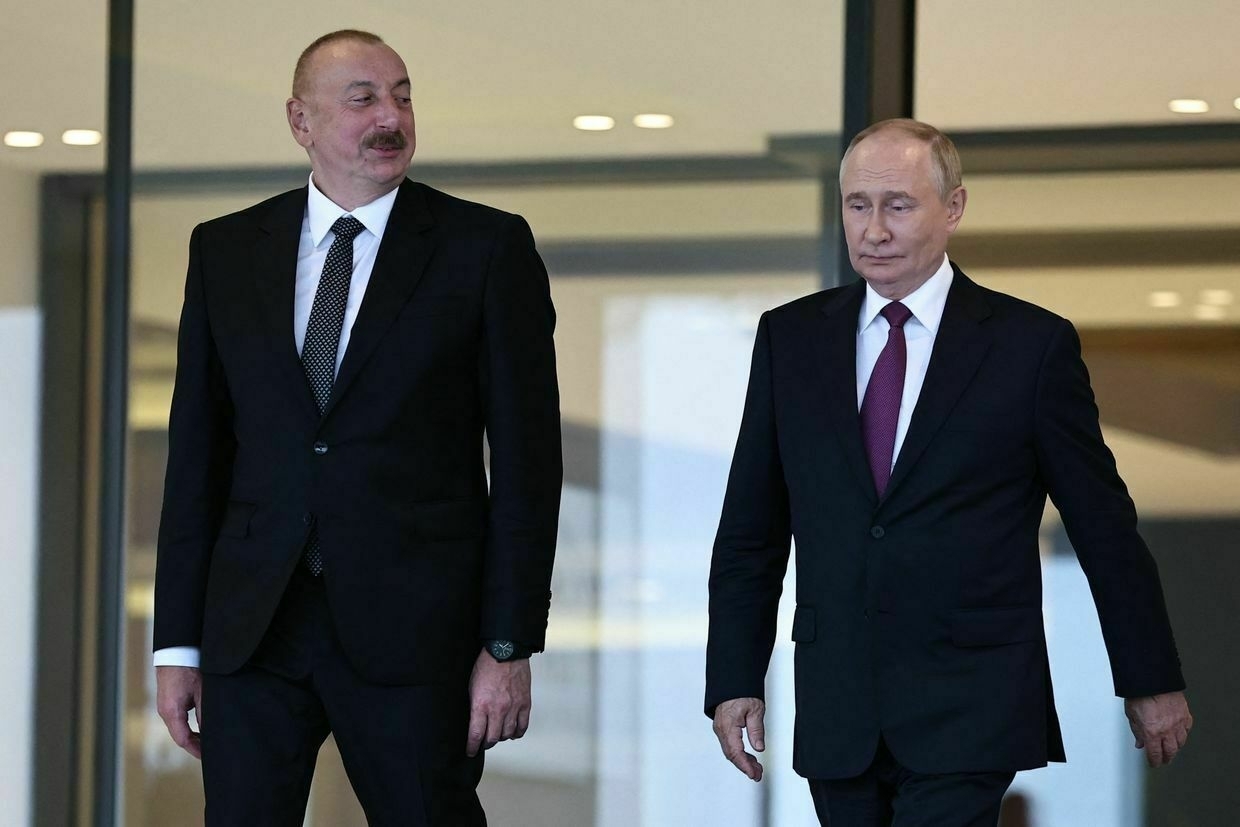
-
Russia's attacks kill 3, injure 34 across Ukraine over past day
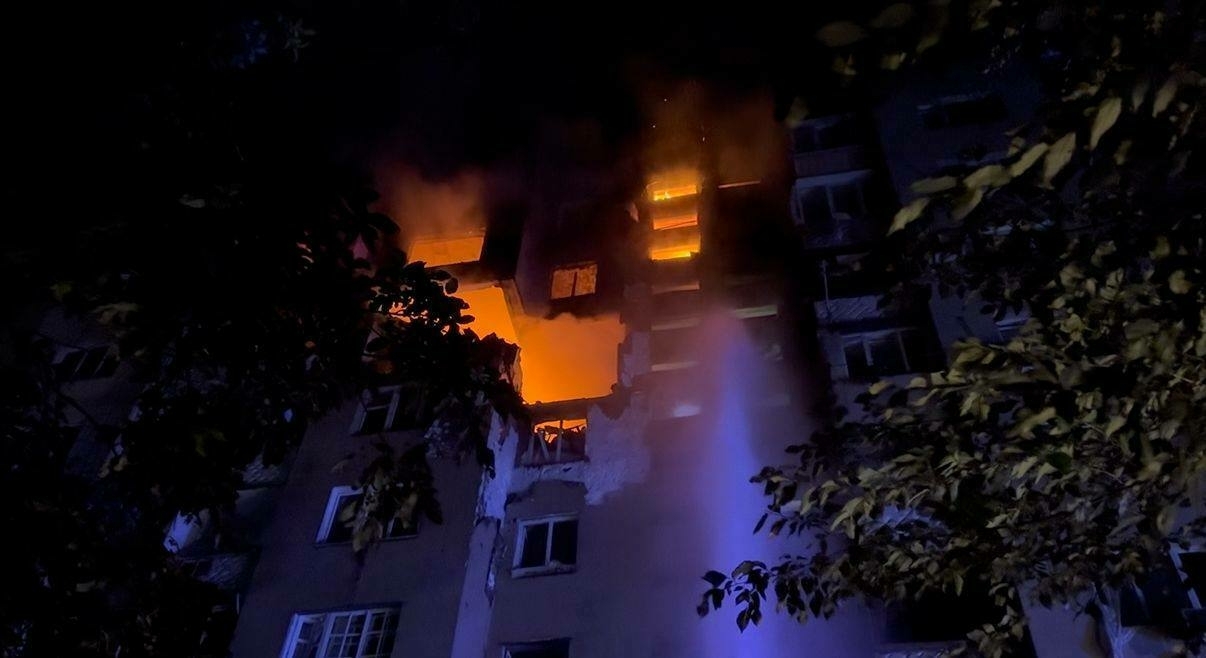
At least three people were killed and 34 injured across Ukraine in Russian drone and missile attacks, Ukrainian regional officials reported on July 3.
Ukraine’s Air Force reported that Russia used 52 drones launched from several directions, including Oryol, Millerovo, and Primorsko-Akhtarsk. Air defenses destroyed 40 of them, including 22 shot down and 18 jammed electronically.
In Donetsk Oblast, three people were killed and at least nine injured in multiple settlements, Governor Vadym Filashkin said. Damage was reported to residential buildings, cars, and utility infrastructure across Pokrovsk, Kostyantynivka, and other towns.
In Kherson Oblast, Russian forces shelled over 30 towns and villages, wounding nine civilians, Governor Oleksandr Prokudin said. Strikes hit both residential neighborhoods and critical infrastructure. One person was hospitalized in Kherson city after being hit by a drone.
In Dnipropetrovsk Oblast, seven civilians were injured, including a 17-year-old girl, as Russia used artillery and drones to strike Nikopol and Synelnykove districts, Governor Serhii Lysak said. Fires broke out in wheat fields, and residential buildings and infrastructure were damaged.
In Odesa, five people were injured, including two children aged 7 and 9, in a Russian drone strike on a residential building, Governor Oleh Kiper reported. Several apartments were destroyed or damaged.
In Zaporizhzhia Oblast, one person was injured and nine settlements were struck over 430 times in the past 24 hours, Governor Ivan Fedorov said. The attacks included airstrikes, FPV drones, and artillery, causing damage to houses and infrastructure.
In Kharkiv Oblast, two people were injured in separate strikes, Governor Oleh Syniehubov said. Civilian infrastructure was damaged in multiple areas, including houses and vehicles.
Russia increasingly targets Ukraine’s cities with cluster munitions, raising civilian tollAmid stalled peace talks, Russia is increasingly attacking Ukrainian cities with cluster munitions, banned by international organizations for the indiscriminate damage they cause to civilians. The civilian casualty toll in Ukraine in 2025 rose by 37% compared with the same period last year, mostly due to Russia’s use ofThe Kyiv IndependentNatalia Yermak
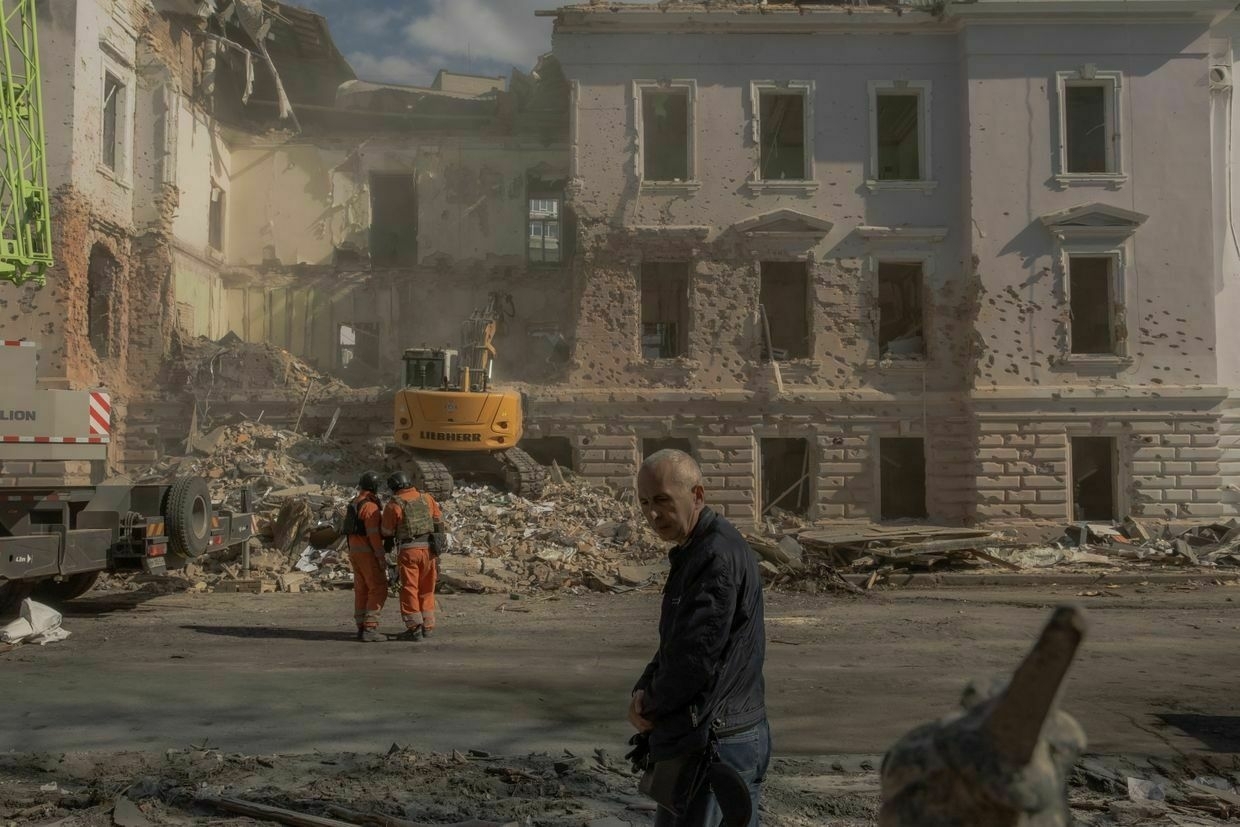
-
Russian strike on Poltava kills 2, injures 11, Ukrainian officials say, conscription office set on fire
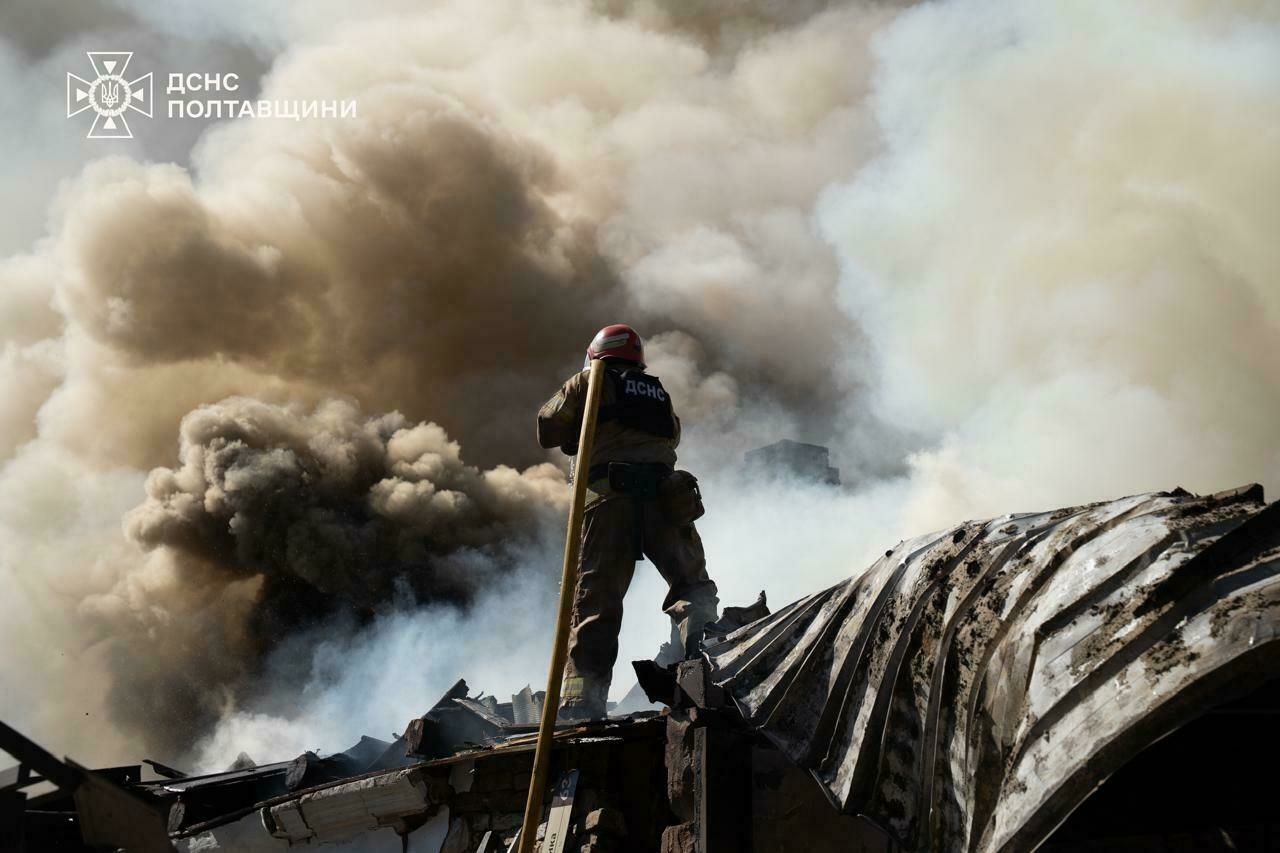
Editor’s note: This is a developing story and is being updated.
A Russian strike on Poltava, central Ukraine, killed two people and injured 11 others on the morning of July 3, local and military officials said.
The attack, which occurred around 9 a.m. local time, sparked fires and damaged civilian infrastructure, according to Governor Volodymyr Kohut and Ukraine’s Land Forces.
According to the statement of Ukraine’s Land Forces, one of the strikes caused a fire at the Poltava conscription office, a local military facility. A separate strike near the Poltava conscription office set fire to a private residential property, authorities said.
Emergency services are on-site, responding to the aftermath. The military said further details about those affected will be provided as they become available.
‘Major casualties among civilians’ — US freeze on air defense missiles is terrible news for UkraineThe halting of deliveries of air defense missiles from the U.S. will lead to“major casualties among civilians,” a deputy commander in Ukraine’s air defense told the Kyiv Independent. Politico reported on July 1 that the U.S. Defense Department (DOD) had halted shipments of some weapons previouslyThe Kyiv IndependentKollen Post
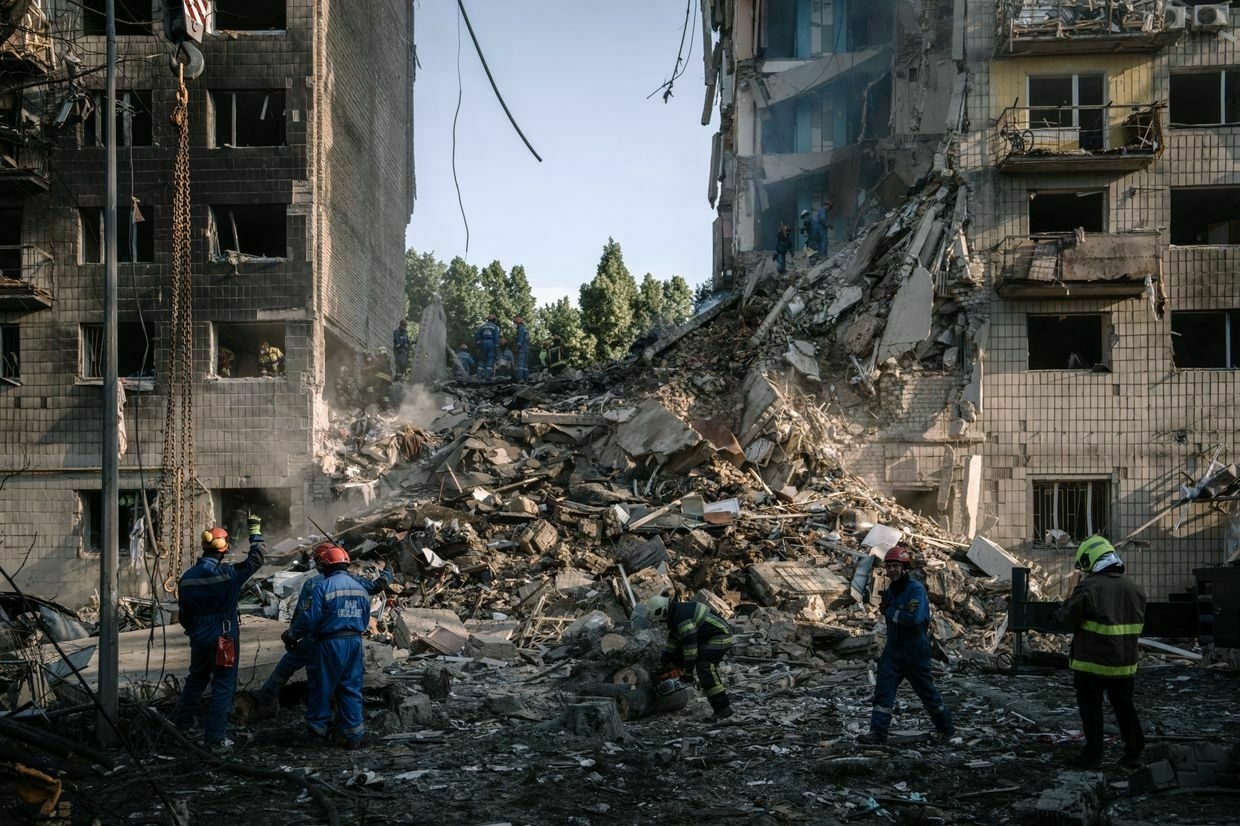
-
US halts Ukraine-bound weapons already staged in Poland, WSJ reports
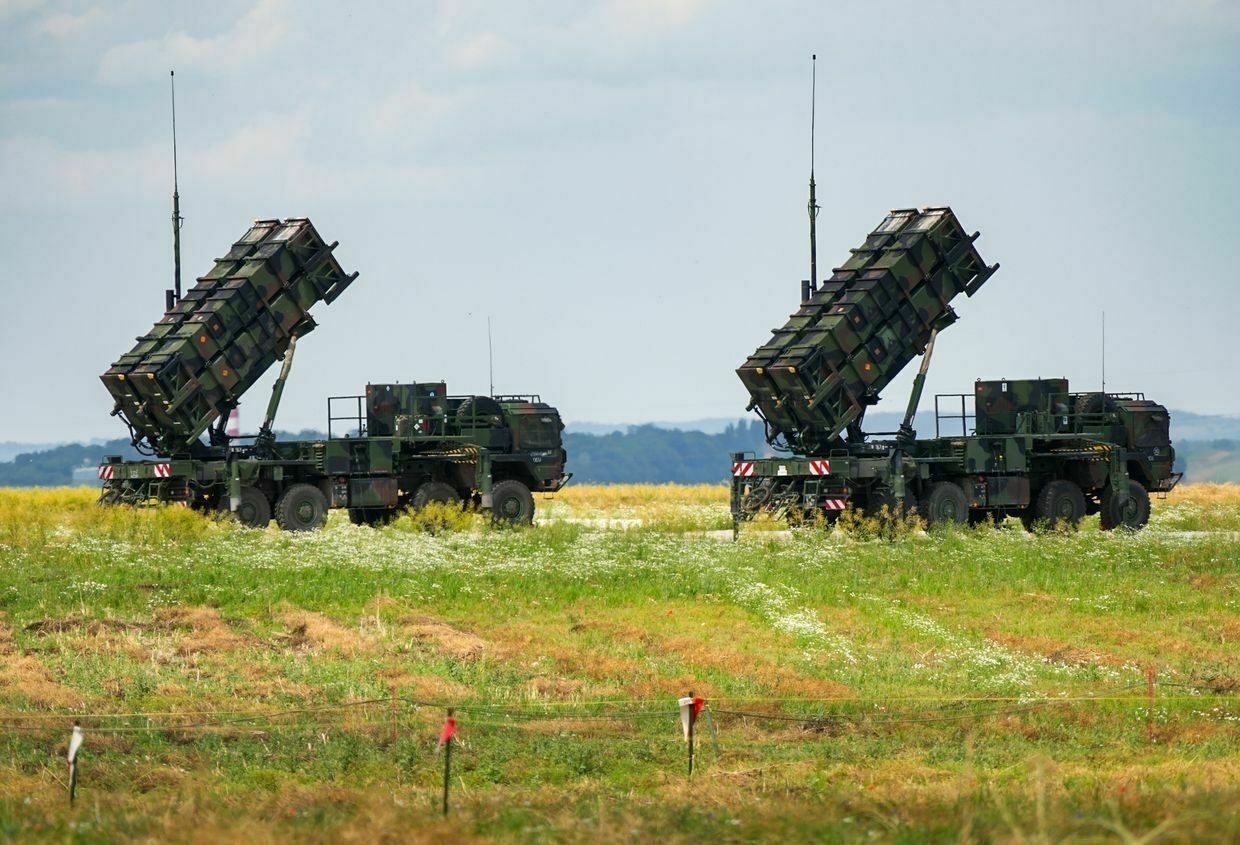
U.S. weapons already in Poland en route to Ukraine have been halted, including advanced air defense systems and precision missiles, the Wall Street Journal reported on July 2.
The Pentagon confirmed the halt in a July 2 briefing, citing an ongoing “capability review” aimed at ensuring U.S. military assistance “aligns with its strategic defense priorities."
The shipment in Poland includes over two dozen PAC-3 Patriot missiles, more than two dozen Stinger air-defense systems, Hellfire air-to-ground missiles, and over 90 AIM air-to-air missiles intended for use with Ukraine’s F-16 fighter jets, according to U.S. administration and congressional officials cited by the Wall Street Journal.
“We see this as a common-sense, pragmatic step towards having a framework to evaluate what munitions are sent and where,” Pentagon spokesperson Sean Parnell said.
The decision has sparked backlash from both sides of the political aisle in Washington. Republican Rep. Brian Fitzpatrick, co-chair of the Congressional Ukraine Caucus, called the pause “unacceptable,” while Democratic Senator Richard Blumenthal labeled it “fallacious and maybe even disingenuous."
The pause comes at a critical moment for Ukraine, which faces intensified Russian missile and drone strikes. On June 29, Russia launched the largest aerial assault against Ukraine since the start of its full-scale invasion in February 2022, targeting civilian infrastructure and cities far beyond the frontline.
NATO Secretary General Mark Rutte, speaking on July 2, emphasized the urgency of continued Western support for Kyiv. “I totally understand that the U.S. always has to make sure its interests are covered,” he said. “But in the short term, Ukraine cannot do without all the support it can get."
The Pentagon has not provided a timeline for when the held-back shipments might resume.
‘Major casualties among civilians’ — US freeze on air defense missiles is terrible news for UkraineThe halting of deliveries of air defense missiles from the U.S. will lead to“major casualties among civilians,” a deputy commander in Ukraine’s air defense told the Kyiv Independent. Politico reported on July 1 that the U.S. Defense Department (DOD) had halted shipments of some weapons previouslyThe Kyiv IndependentKollen Post
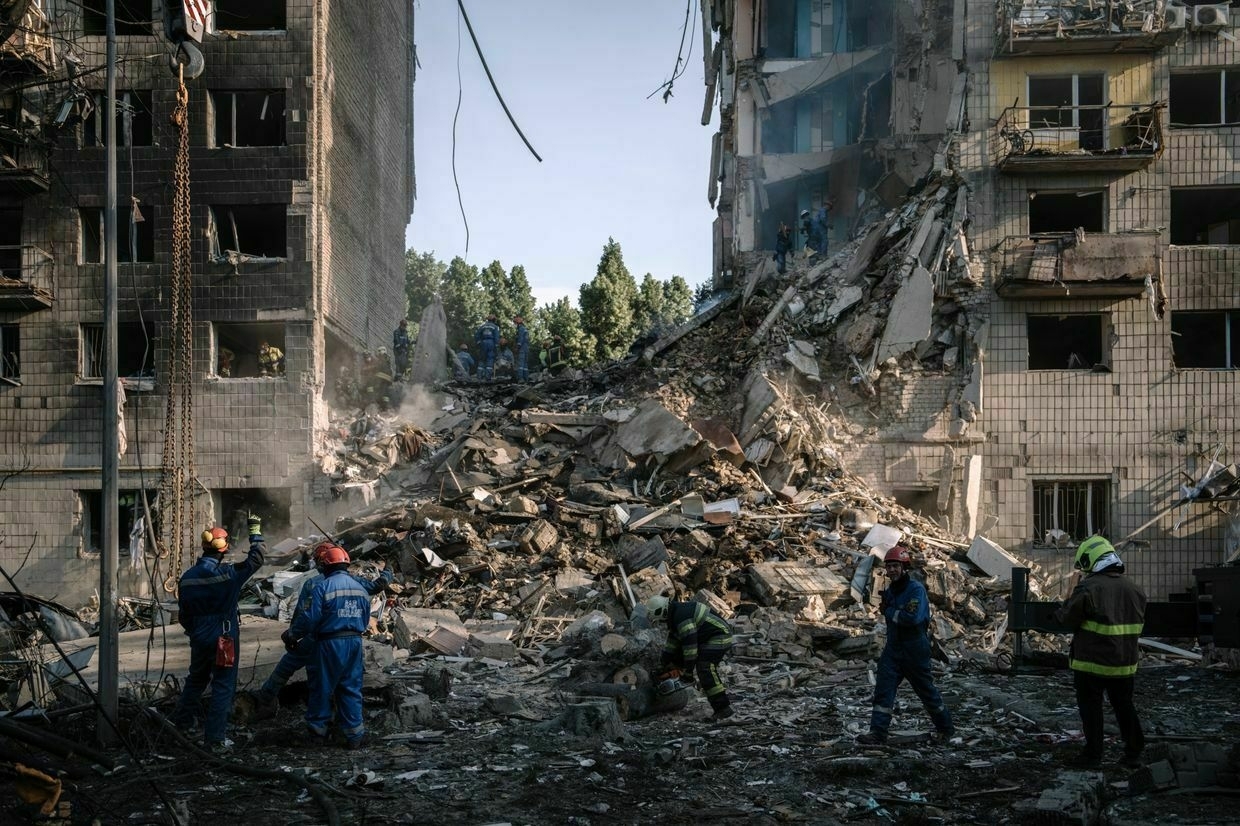
-
Poland establishes July 11 as National Day of Remembrance for Volyn massacre victims
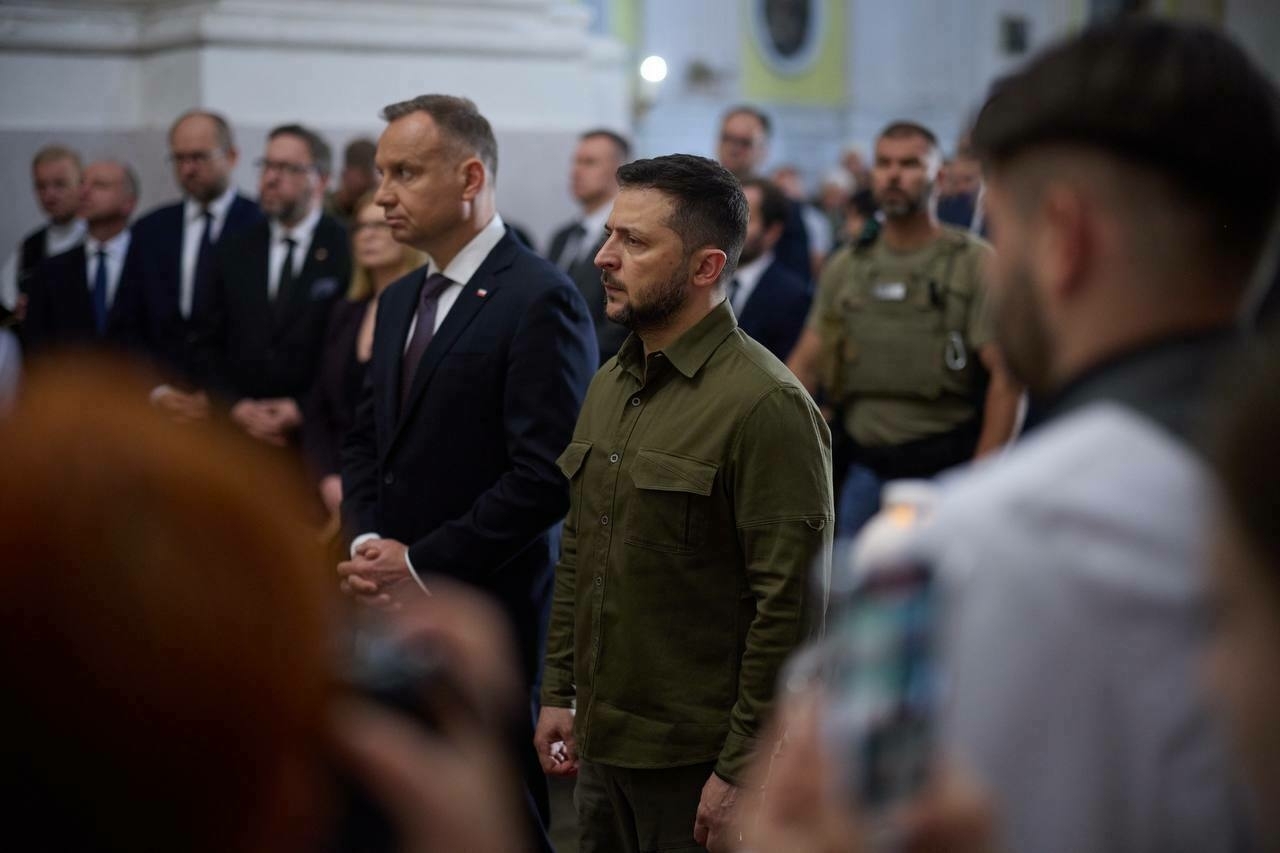
Polish President Andrzej Duda has signed legislation designating July 11 as the National Day of Remembrance for Poles who were victims of Volyn massacres, the Polish outlet RMF24 reported on July 2.
The law passed both houses of Poland’s parliament with reportedly near-unanimous support. Lawmakers said victims of the massacres deserve a permanent place in the nation’s collective memory.
The law states that from 1939 to 1946, members of the Organization of Ukrainian Nationalists (OUN), the Ukrainian Insurgent Army (UPA), and other nationalist groups carried out mass killings of Polish civilians in the Volyn region, now part of modern-day Ukraine.
The Volyn massacres remain a deeply sensitive and divisive issue in Polish-Ukrainian relations. In April, a team of Polish and Ukrainian researchers resumed the first exhumation in western Ukraine since 2017 — a symbolic breakthrough following years of tension. The moratorium had been imposed by Ukraine after a wave of vandalism targeting Ukrainian memorials in Poland.
The excavation began at the destroyed village of Puzhnyky in Ternopil Oblast, where UPA fighters are believed to have killed between 50 and 120 Poles in February 1945.
In recent months, the Polish and Ukrainian governments have made efforts to resolve the issue of the Volyn exhumations, with Poland’s Prime Minister Donald Tusk announcing a “breakthrough” in January.
Last year Polish officials, including Deputy Prime Minister Wladyslaw Kosiniak-Kamysz and former Deputy Foreign Minister Pawel Jablonski, warned that Ukraine’s progress toward EU accession could be blocked unless Kyiv fully addresses the legacy of the Volyn massacre and allows further exhumations of Polish victims.
Poland’s Institute of National Remembrance estimates that approximately 100,000 Poles were killed during the Volyn massacres. Ukrainian historians argue that thousands of Ukrainians were also killed in retaliatory actions and insist that the conflict be viewed as mutual ethnic violence rather than genocide.
In 2016, the Polish Parliament officially recognized the events as genocide. Ukrainian and many Western scholars, however, classify them as ethnic cleansing, and debate continues over both the terminology and historical responsibility.
Despite close cooperation in defense and diplomacy since Russia’s full-scale invasion of Ukraine, the legacy of Volyn remains a potential stumbling block in Ukraine’s integration with Europe.
July 11 will now be commemorated annually in Poland.
Ukraine’s Constitutional Court appointments: A test of EU commitmentAs Ukraine continues its path toward European integration while defending itself against Russian aggression, the strength of its democratic institutions remains paramount. Among these institutions, the Constitutional Court plays a unique role in protecting citizens’ rights and maintaining the rule of law. Yet today, this crucial judicial body still lacksThe Kyiv IndependentTetiana Shevchuk
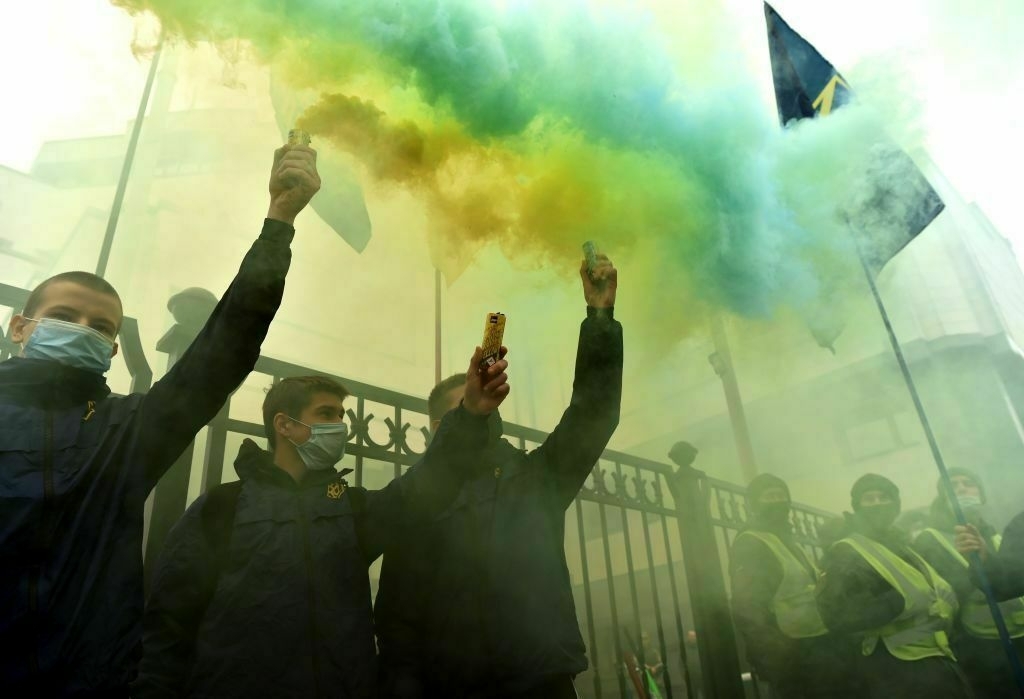
-
General Staff: Russia has lost 1,023,090 troops in Ukraine since Feb. 24, 2022
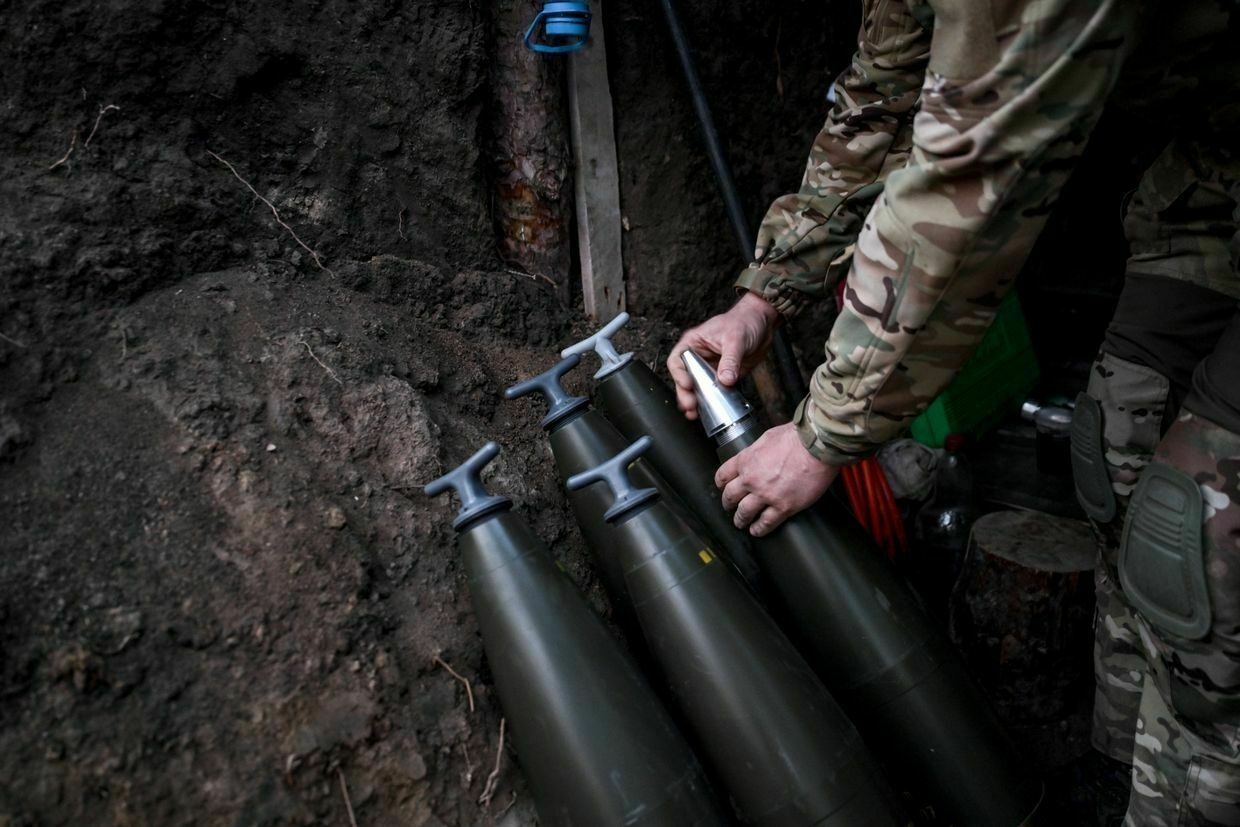
Russia has lost 1,023,090 troops in Ukraine since the beginning of its full-scale invasion on Feb. 24, 2022, the General Staff of Ukraine’s Armed Forces reported on July 3.
The number includes 1,000 casualties that Russian forces suffered just over the past day.
According to the report, Russia has also lost 10,986 tanks, 22,936 armored fighting vehicles, 53,887 vehicles and fuel tanks, 29,815 artillery systems, 1,427 multiple launch rocket systems, 1,191 air defense systems, 420 airplanes, 340 helicopters, 43,098 drones, 3,436 cruise missiles, 28 ships and boats, and one submarine.
Arrests, raids, beaten and bloodied suspects — how Russia-Azerbaijan relations have unravelledDeaths in custody, media offices raided, and beaten and bloodied suspects paraded in court — relations between Russia and Azerbaijan, once considered close, have sharply deteriorated in recent days amid a series of high-profile incidents. The latest tensions erupted over the weekend when Russian law enforcement officers detained over 50 AzerbaijaniThe Kyiv IndependentTim Zadorozhnyy
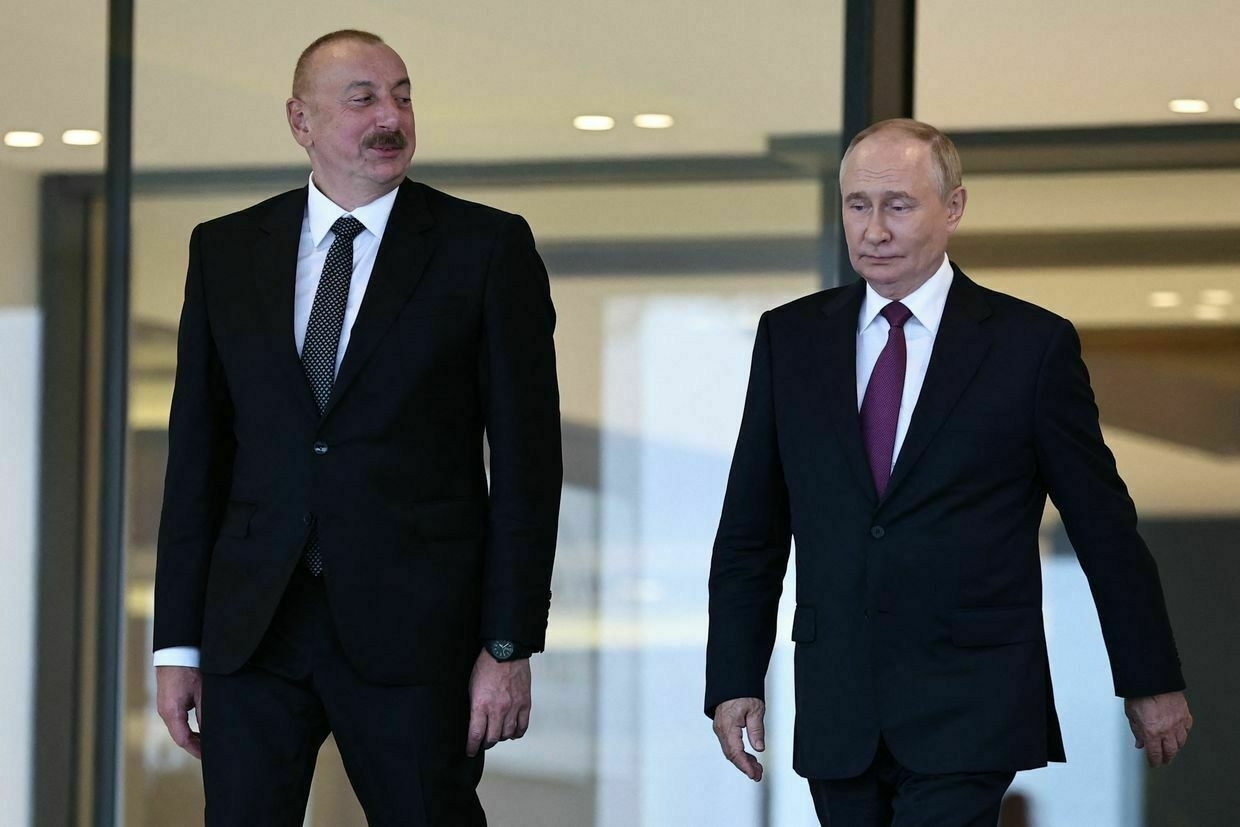
-
New UK-Ukraine joint venture to manufacture, supply Ukrainian-designed drone in Britain
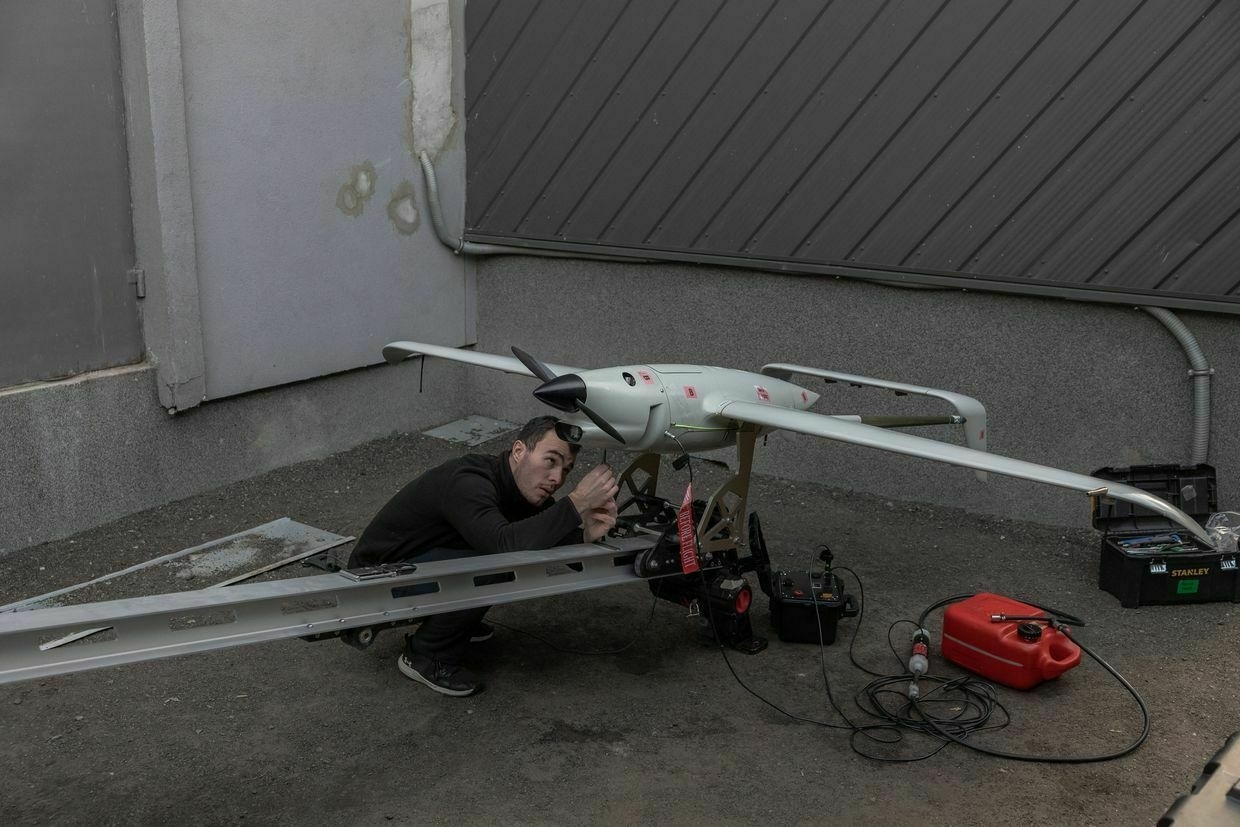
Skyeton Prevail Solutions, a joint venture between Ukrainian drone manufacturer Skyeton and U.K.-based defense company Prevail Solutions, will manufacture and supply Raybird drones in the U.K., the two companies announced on July 2.
“Skyeton — a Ukrainian unmanned aircraft systems company with 19 years of engineering pedigree, and Prevail Partners — a leading U.K. defense and security company, announced a joint venture to fast-track the volume manufacture, supply, and support for the integration of its best-in-class drone into U.K. military applications,” a statement by the two companies said.
Ukraine has developed drones that have proven to be effective amid the onset of Russia’s full-scale war against Ukraine in February 2022 and Russia’s initial invasion of Ukraine in 2014.
President Volodymyr Zelensky and U.K. Prime Minister Keir Starmer met in London on June 23, where the two leaders agreed to an “industrial military co-production agreement."
“The joint venture will scale the availability of Raybird with new manufacturing in the U.K. for both deployment in Ukraine and provide the necessary integration expertise from Prevail Partners for U.K. and other Western militaries,” the statement said.
U.K. lawmaker Iain Duncan Smith described the move as an “important step” for U.K. drone production.
Skyeton says its Raybird drone has over 350,000 flight hours and is responsible for billions of dollars in Russian losses.
Ukraine has relied on drones to meet its own defense needs, as foreign military aid has fallen short in supplying necessary weapons and air defenses.
Ukraine’s new interceptor UAVs are starting to knock Russia’s long-range Shahed drones out of the skyRussia’s Shahed drone swarms are pummeling Ukraine on a nightly basis, inflicting ever more death and destruction in cities that had managed to carve out some sense of normalcy amid wartime. Civilian alarm has grown. With traditional air defense stockpiles running low, the government is banking on newly createdThe Kyiv IndependentKollen Post
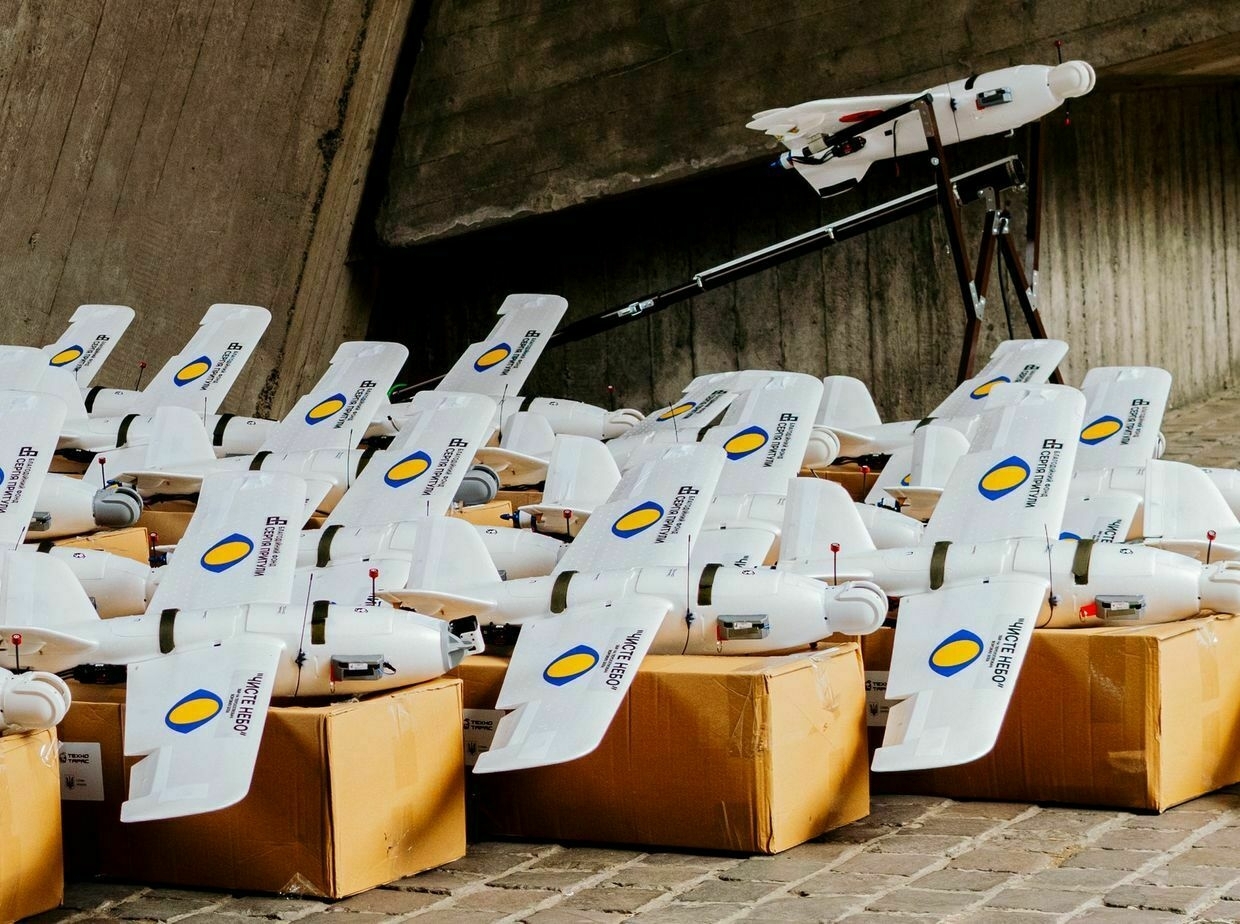
-
Drone wreckage kills 1, injures 2 in Russia's Lipetsk, authorities say

Editor’s note: This is a developing story and is being updated.
Drone wreckage killed one person and injured two in Lipetsk, Russia, local Governor Igor Artamonov said early on July 3.
“The wreckage of the drone fell on a private residential building in the Lipetsk Urban District. Unfortunately, there are victims. A woman born in 1954 who lived in the house died. Two more people were injured,” Artamonov said in a post to Telegram.
The Kyiv Independent could not independently verify the claims.
Ukraine regularly strikes military targets deep within Russian territory in an effort to diminish Moscow’s fighting power in its ongoing war.
Overnight on June 26, explosions were reported in Moscow, prompting airport closures, with Russia’s Defense Ministry claiming 50 Ukrainian drones were downed across the country.
Kaluga airport and Moscow’s Vnukovo airport had flight restrictions imposed amid the drone attack, Artyom Korenyako, a spokesperson for Russia’s state aviation agency Rosaviatsia, said early on June 26.
On June 1, Ukraine launched a game-changing drone attack on four key Russian military airfields, damaging 41 planes, including heavy bombers and rare A-50 spy planes.
Kyiv claims it has disabled 34% of Russia’s strategic bomber fleet in what is seen as one of the most daring operations during Russia’s full-scale war.
Arrests, raids, beaten and bloodied suspects — how Russia-Azerbaijan relations have unravelledDeaths in custody, media offices raided, and beaten and bloodied suspects paraded in court — relations between Russia and Azerbaijan, once considered close, have sharply deteriorated in recent days amid a series of high-profile incidents. The latest tensions erupted over the weekend when Russian law enforcement officers detained over 50 AzerbaijaniThe Kyiv IndependentTim Zadorozhnyy
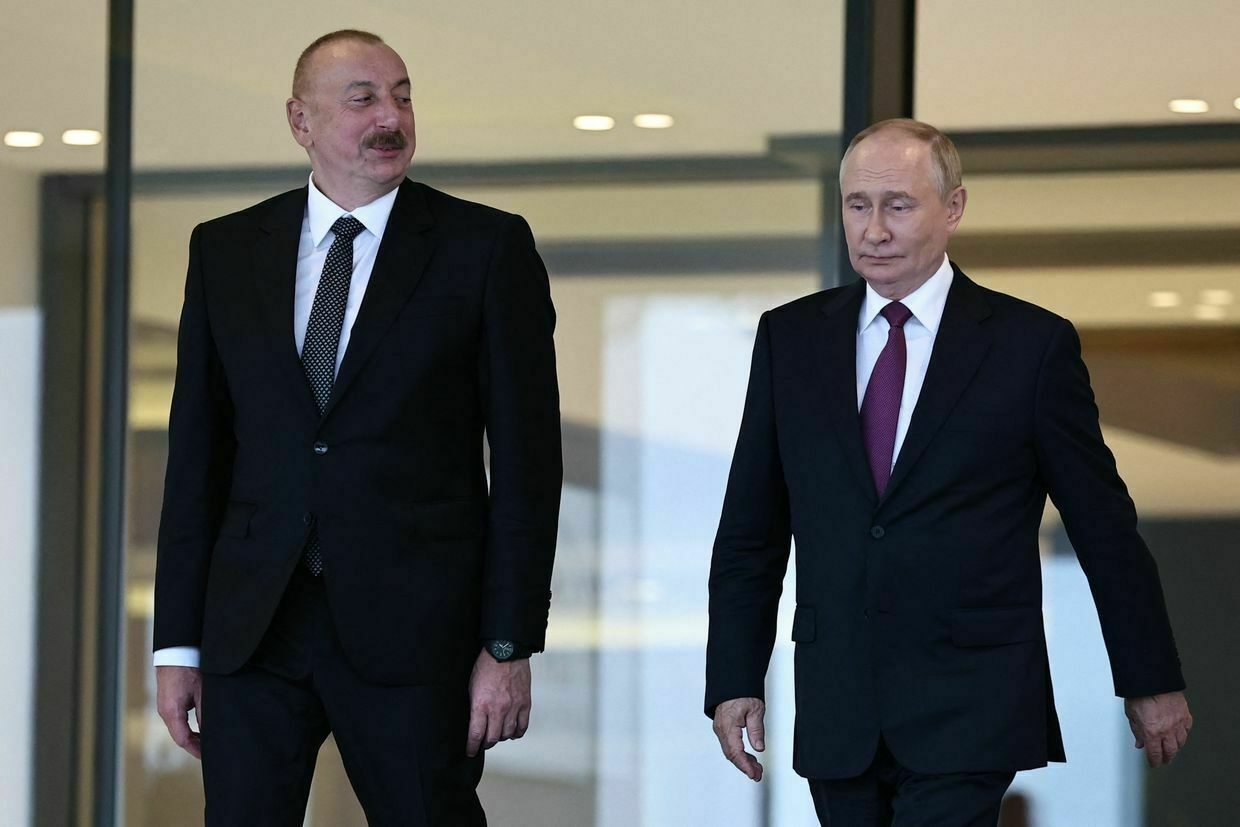
-
Pentagon confirms 'capability review' amid pause in aid deliveries to Ukraine
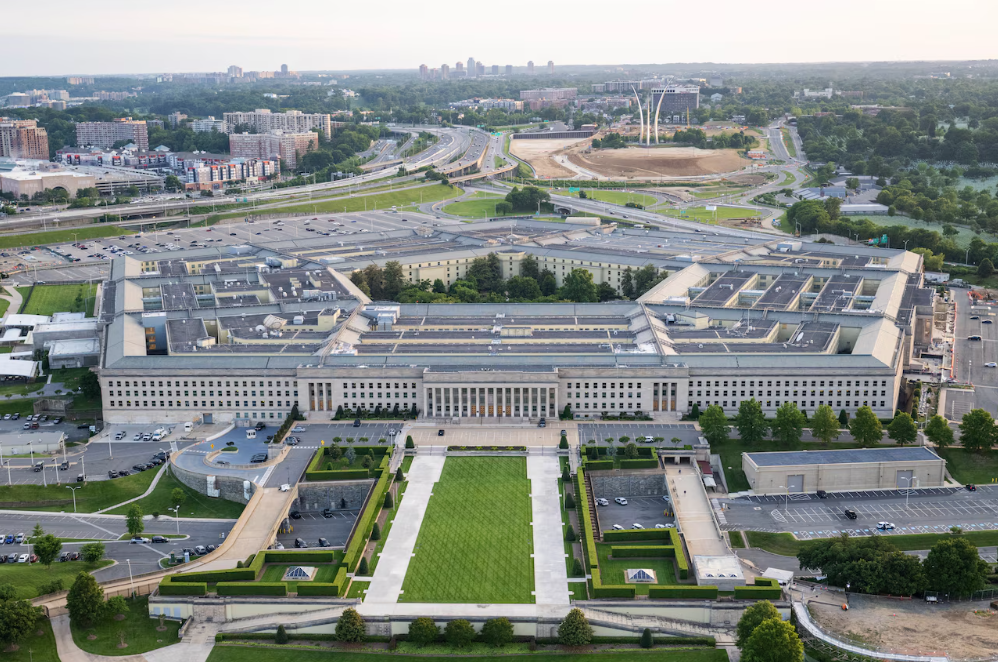
Pentagon spokesperson Sean Parnell confirmed on July 2 that some assistance to Ukraine has been halted as the U.S. Defense Department conducts a review of foreign aid deliveries.
“This capability review… is being conducted to ensure U.S. military aid aligns with our defense priorities… We see this as a common-sense, pragmatic step towards having a framework to evaluate what munitions are sent and where,” Parnell said.
The White House earlier confirmed the pause in shipments, citing a broader reassessment of U.S. military stockpiles amid media reports of the halt in military assistance.
The weapons reportedly being held back include two dozen Patriot air defense missiles, over two dozen Stinger air-defense systems, precision artillery rounds, Hellfire missiles, drones, and more than 90 AIM air-to-air missiles launched from F-16 fighter jets.
New U.S. military aid packages have not been approved since U.S. President Donald Trump was inaugurated in January, raising concern among Ukraine’s allies.
“Ultimately, our job here at the Department of Defense is to pursue the president’s ‘America First’ agenda and make sure that we achieve peace through strength throughout the world,” Parnell said at a Pentagon press briefing.
The U.S. Defense Department will not provide updates on the timeline and quantity or type of munitions provided to Ukraine, he added.
“What we’ve done here at the Department of Defense is create a framework to analyze what munitions we’re sending (and) where,” Parnell said.
A bipartisan group of U.S. lawmakers has voiced their opposition to the decision to halt military aid shipments to Ukraine.
“We must build up our own Defense Industrial Base here in the U.S. while simultaneously providing the needed assistance to our allies who are defending their freedom from brutal invading dictators. To not do both is unacceptable,” Republican Rep. Brian Fitzpatrick, the co-chair of the Congressional Ukraine Caucus, said.
Democratic Senator Richard Blumenthal, a member of the Senate Armed Services Committee, described the military aid pause as “fallacious and maybe even disingenuous."
NATO Secretary General Mark Rutte said on July 2 that he understands the White House’s need to safeguard its own defense capabilities, but underscored that Ukraine urgently requires sustained support.
“I totally understand that the U.S. always has to make sure its interests are covered… When it comes to Ukraine, in the short term, Ukraine cannot do without all the support it can get,” Rutte said.
The Washington Post reported that the military aid was already in Poland, being prepared for delivery to Ukraine.
‘Major casualties among civilians’ — US freeze on air defense missiles is terrible news for UkraineThe halting of deliveries of air defense missiles from the U.S. will lead to“major casualties among civilians,” a deputy commander in Ukraine’s air defense told the Kyiv Independent. Politico reported on July 1 that the U.S. Defense Department (DOD) had halted shipments of some weapons previouslyThe Kyiv IndependentKollen Post
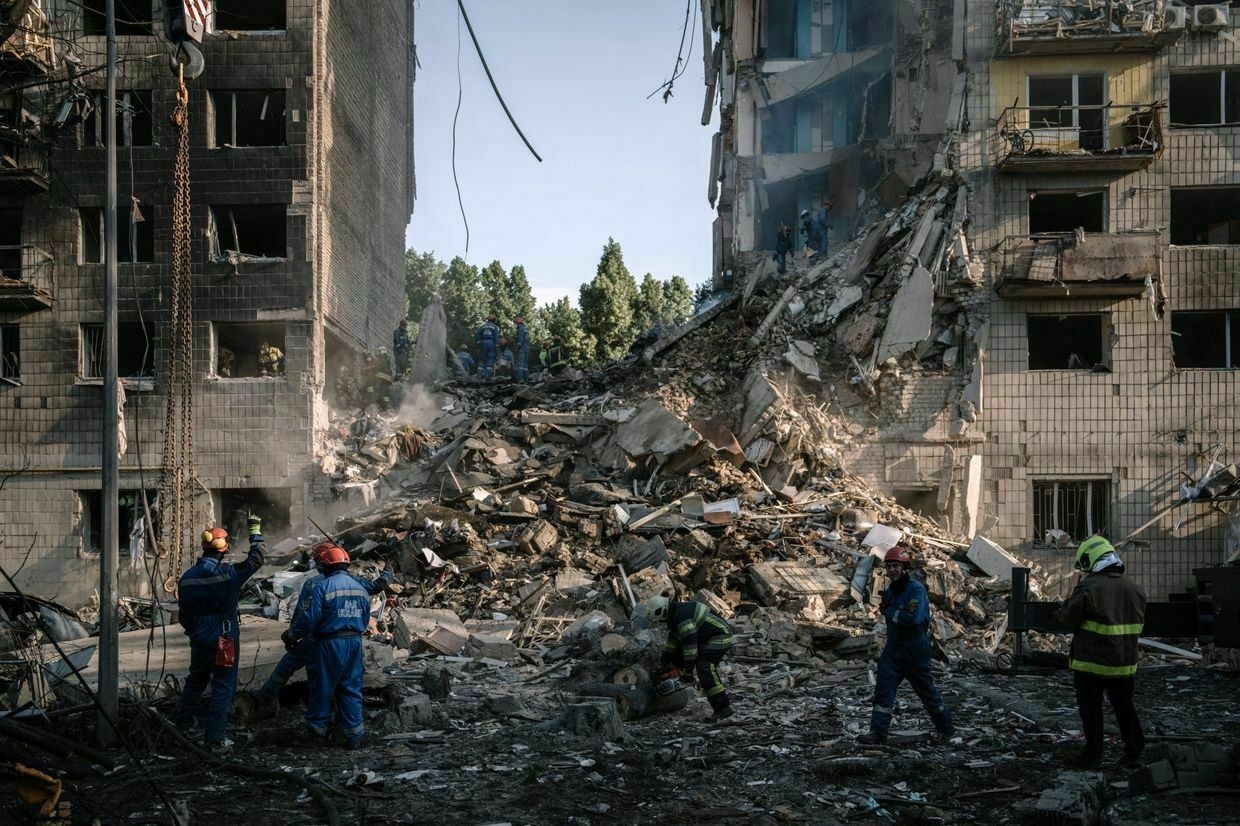
-
'They're going to lose more lives' — US lawmakers voice opposition to Trump administration halting air defense shipments to Ukraine

A bipartisan group of U.S. lawmakers are voicing their opposition to the Trump administration’s decision to halt shipments of some air defense missiles and other weapons previously promised to Kyiv.
The U.S. Defense Department (DOD) made the decision to pause the aid deliveries after conducting a review of U.S. munitions stocks, reportedly concerned about dwindling levels of artillery rounds, air defense missiles, and precision munitions.
Among the items being held back from Ukraine are over two dozen Patriot air defense missiles, over two dozen Stinger air-defense systems, precision artillery rounds, Hellfire missiles, drones, and more than 90 AIM air-to-air missiles that Ukraine launches from F-16 fighter jets. The Washington Post reported that the weapons were already in Poland being prepped for delivery to Ukraine.
Republican Rep. Brian Fitzpatrick, the co-chair of the Congressional Ukraine Caucus, lambasted the decision in a post on X.
I will be aggressively looking into this matter and will be demanding accountability. We must build up our own Defense Industrial Base here in the U.S. while simultaneously providing the needed assistance to our allies who are defending their freedom from brutal invading… https://t.co/pRTOMCghWh
— Rep. Brian Fitzpatrick 🇺🇸 (@RepBrianFitz) July 2, 2025Fitzpatrick, a staunch ally of Ukraine who has previously visited the front line, said he "will be aggressively looking into this matter and will be demanding accountability."
"We must build up our own Defense Industrial Base here in the U.S. while simultaneously providing the needed assistance to our allies who are defending their freedom from brutal invading dictators. To not do both is unacceptable," the Congressman added.
In a letter to U.S. President Donald Trump about the reported halt of air defense deliveries, Fitzpartick requested an emergency briefing from the White House and DOD on the shipments.
"Ukraine's courage must continue to be met with action, and the United States must continue to lead with clarity and purpose," Fitzpartick wrote.
Another Republican House member, Rep. Michael McCaul, said he is examining "very intensely" whether the Pentagon’s freeze breaches legislation on aid to Ukraine passed in 2024, Politico reported.
As Trump continues to call for a ceasefire from Moscow, McCaul said that the decision comes "at the wrong time."
"If you want to get (Russian President Vladimir Putin) to the negotiating table in good faith, you have to put leverage and pressure on him, and that would be (Senator) Lindsey Graham’s economic sanctions and the flow of weapons," McCaul said. "If you take the flow of weapons out, yeah, then you’re not, you don’t have the leverage over Putin to negotiate."
Other Republican members of Congress have thus far dismissed concerns over the reported halts, stating that they are waiting to be briefed with additional information before speaking about the reports.
On the other side of the isle, Democratic lawmakers have also lambasted the real world implications of halting military aid for Ukraine.
Senator Richard Blumenthal, a member of the Senate Armed Services Committee, said in an interview that more civilians are "going to lose more lives, more people will be maimed and injured — more homes, hospitals, schools will be destroyed," calling the decision, "fallacious and maybe even disingenuous."
Since his inauguration in January, Trump has not approved any additional military aid packages for Ukraine. Defense Secretary Pete Hegseth also announced recently that the U.S. will reduce the total aid it sends to Ukraine in its upcoming defense budget.
In his evening address on July 2, President Volodymyr Zelensky said Ukrainian and U.S. officials are working through the aid issue at a "working level," including discussions on critical air defense support. Head of the Presidential Office Andriy Yermak held a late night phone call with Rep. Brian Mast, Chair of the House Committee on Foreign Affairs.
Ukraine's Defense Ministry said it has not received any formal notification of delays or cancellations but has requested urgent consultations with U.S. defense officials.
The Foreign Ministry also summoned U.S. Charge d'Affaires John Ginkel, warning that "any hesitation" in military support would encourage further Russian aggression.
The Kremlin welcomed the decision, with spokesperson Dmitry Peskov saying, "The fewer weapons that are supplied to Ukraine, the closer the end of the (war)."
NATO Secretary General Mark Rutte expressed understanding of Washington's desire to safeguard its stockpiles but said, "Ukraine cannot do without all the support it can get."
Ukraine war latest: As Russia ramps up missile attacks, US halts promised air defense shipments to UkraineKey developments on July 2: * As Russia ramps up missile attacks, US halts promised air defense shipments to Ukraine * North Korea to send up to 30,000 more troops to aid Russia’s war against Ukraine, CNN reports * Ukraine denies another Russian claim of Dnipropetrovsk Oblast breakthrough, says small incursion repelledThe Kyiv IndependentThe Kyiv Independent news desk
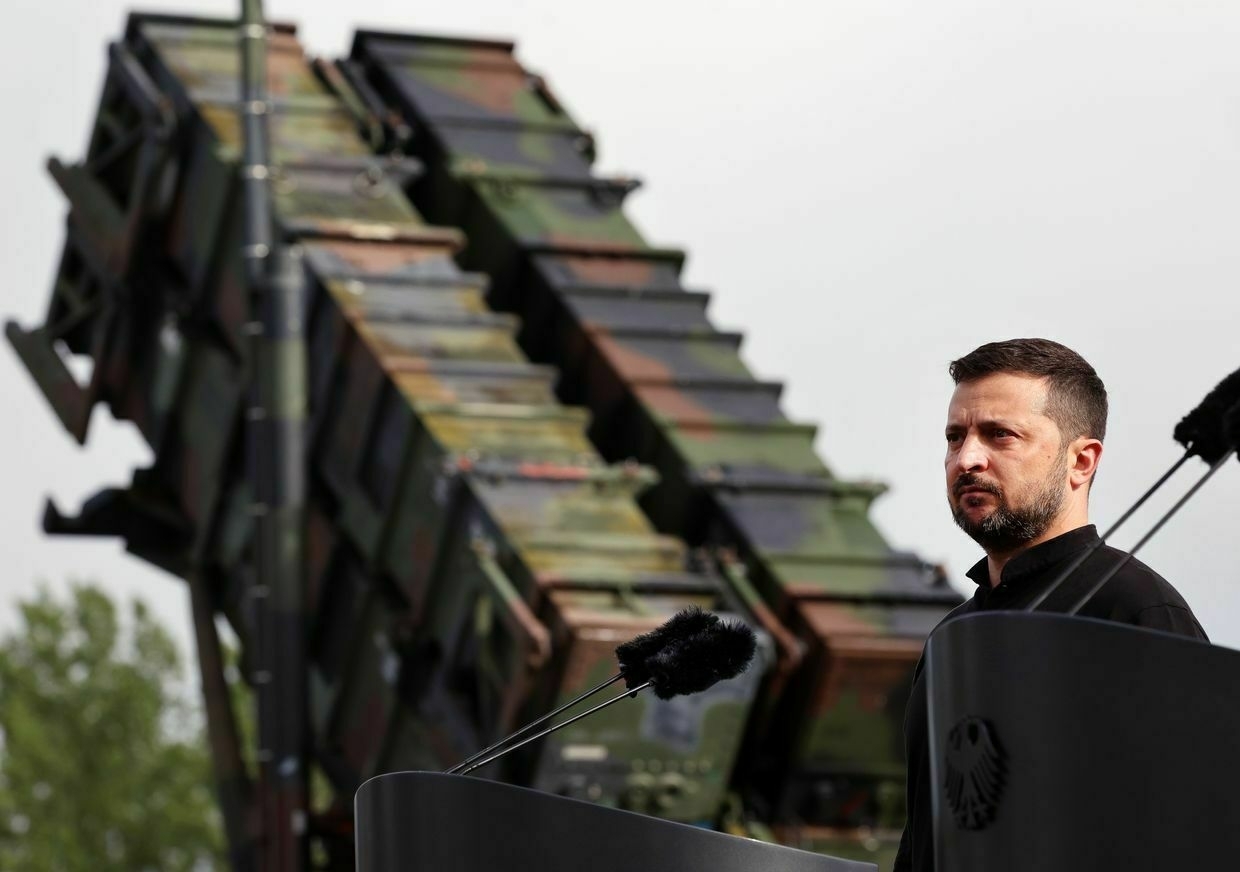
-
Ukraine reportedly strikes ammunition depot in occupied Donetsk Oblast
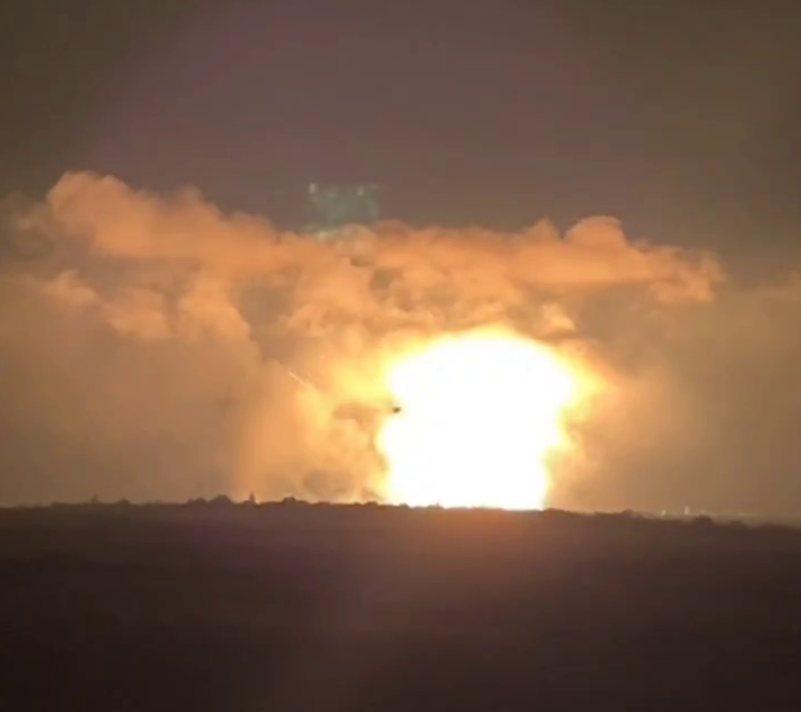
Editor’s note: This is a developing story and is being updated.
Ukraine reportedly struck a Russian ammunition depot in the town of Khartsyzk in occupied Donetsk Oblast on July 2, Russian Telegram channels reported.
Videos posted on social media purportedly show massive explosions near the reported ammunition depot, located just east of the Russian-occupied city of Donetsk.
The Kyiv Independent cannot immediately verify the reports.
Ukraine’s military has not commented on the reported attack. No information was immediately available as to the extent of the damage caused.
0:00/A purported video of explosions at a Russian ammunition depot in occupied Donetsk Oblast on July 2, 2025. (ASTRA/Telegram) Ukraine’s military regularly strikes military targets in Russian-occupied territories and deep within Russia in an attempt to diminish Moscow’s fighting power as it continues its war against Ukraine.
On the evening of June 30, Ukraine similarly struck a command post of the 8th Combined Arms Army of the Russian Armed Forces in the Russian-occupied part of Donetsk Oblast.
Russia has for months focused its offensive efforts on the embattled town of Pokrovsk in Donetsk Oblast and has recently been escalating attempts to break through to neighboring Dnipropetrovsk Oblast, a region that has not yet seen combat.
Ukraine war latest: As Russia ramps up missile attacks, US halts promised air defense shipments to UkraineKey developments on July 2: * As Russia ramps up missile attacks, US halts promised air defense shipments to Ukraine * North Korea to send up to 30,000 more troops to aid Russia’s war against Ukraine, CNN reports * Ukraine denies another Russian claim of Dnipropetrovsk Oblast breakthrough, says small incursion repelledThe Kyiv IndependentThe Kyiv Independent news desk
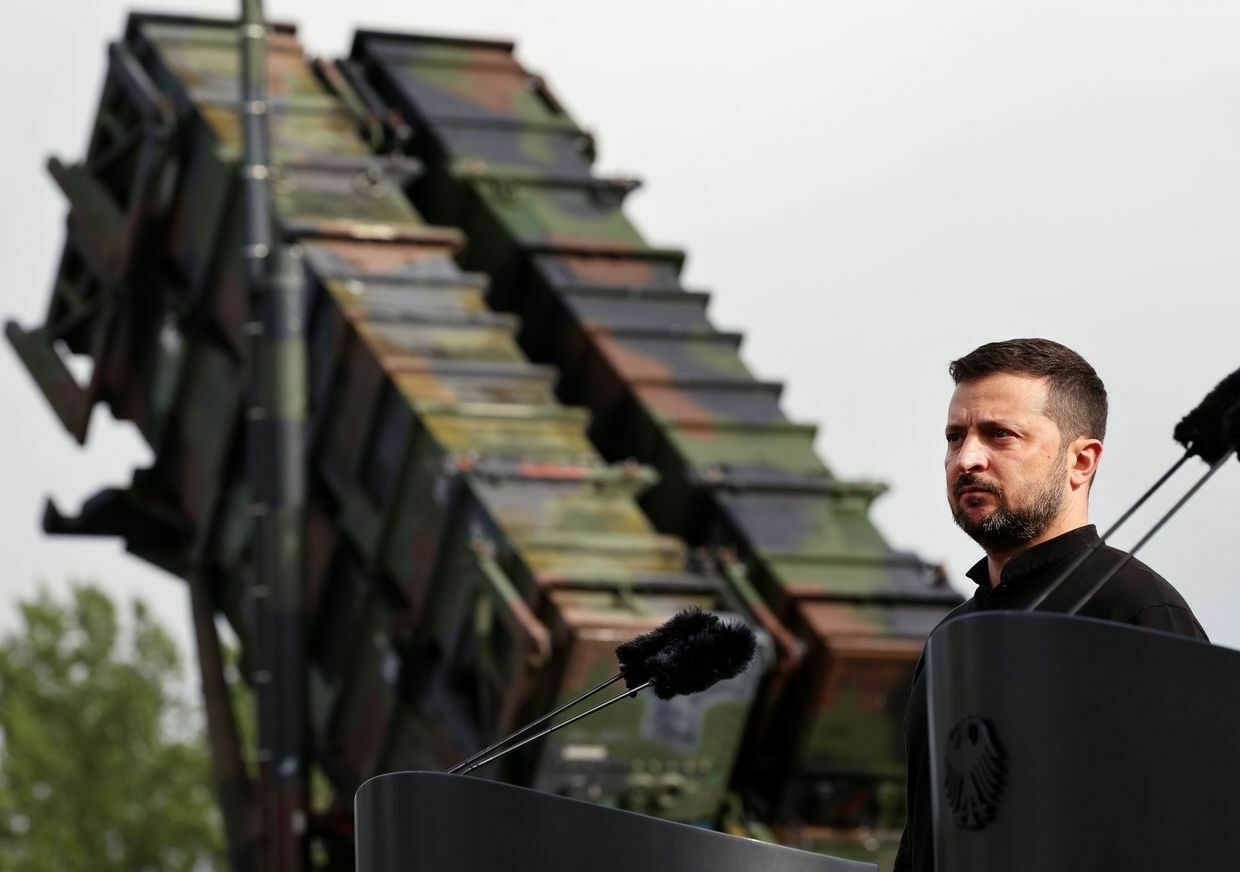
-
Ukraine's Constitutional Court appointments: A test of EU commitment
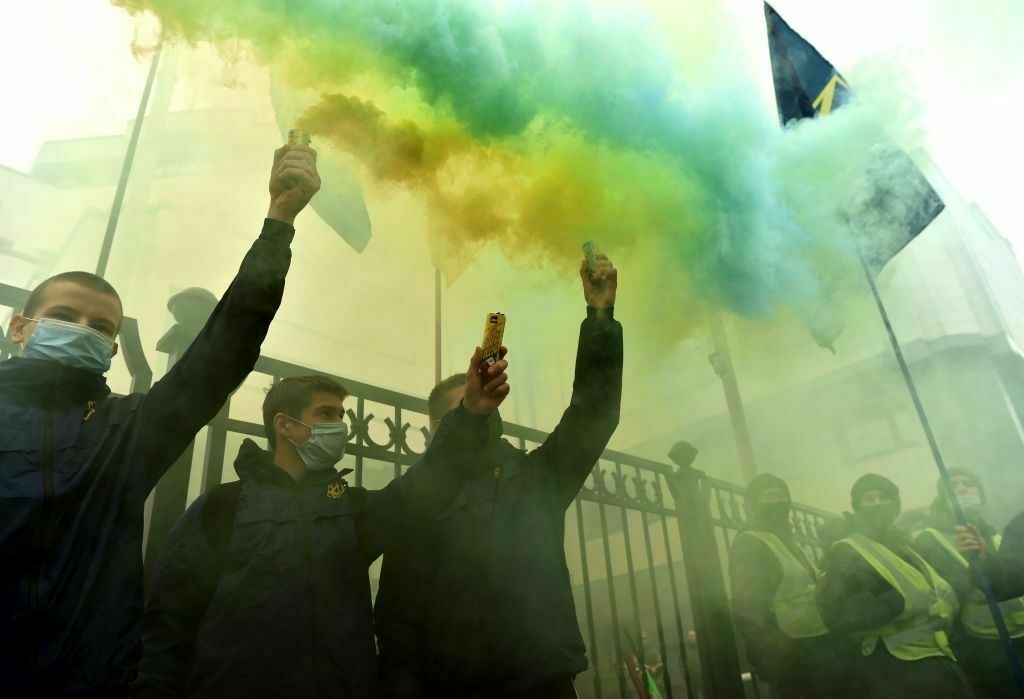
As Ukraine continues its path toward European integration while defending itself against Russian aggression, the strength of its democratic institutions remains paramount.
Among these institutions, the Constitutional Court plays a unique role in protecting citizens' rights and maintaining the rule of law.
Yet today, this crucial judicial body still lacks the judges needed for full functionality, with six out of 18 seats remaining vacant.
This situation, while concerning in any circumstances, takes on particular importance as Ukraine works to show its commitments as an EU candidate country.
With Trump disengaged and EU complacent, Ukrainian reforms lose momentumRussia’s all-out war has accelerated Ukraine’s push to join the European Union and NATO, as well as its dependence on Western loans and aid. Before, these things would have been heavily preconditioned on Ukraine implementing crucial reforms. However, the war has also eased the pressure on Kyiv to carry outThe Kyiv IndependentOleg Sukhov
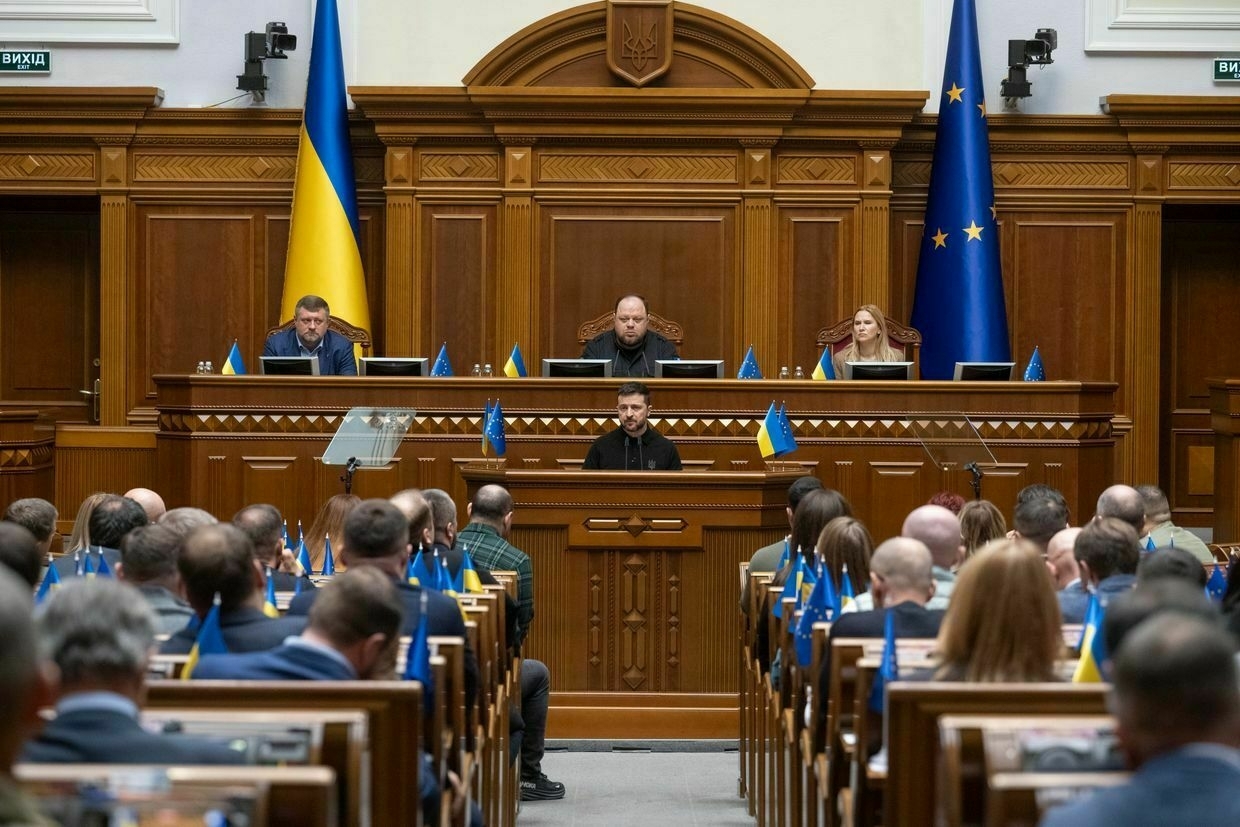
The situation reached a tipping point in January 2025 when three Constitutional Court judges completed their terms. For five months, the court lacked the quorum necessary for its Grand Chamber sessions, which required the presence of 12 judges and at least 10 votes to adopt decisions.
On June 28, President Volodymyr Zelensky appointed Oleksandr Vodiannikov, former coordinator of OSCE projects in Ukraine, as a judge of the Constitutional Court. Formally, it restored the quorum, but the underlying problem of the lack of judges remains unsolved.
The reform of the Constitutional Court is among the biggest challenges the country is facing.
The urgency became undeniable in 2020, when the court effectively dismantled a key anti-corruption reform, overturning the electronic asset declaration system. This crisis prompted the Venice Commission to recommend depoliticizing the judge selection process.
However, real momentum to reform the tainted court emerged only in the summer of 2022, when the European Commission identified the Constitutional Court reform as the primary condition for opening EU membership negotiations. It became the first of the seven key requirements for maintaining Ukraine’s candidate status. This external pressure pushed the needle, something domestic activists couldn’t achieve alone.
In response, Ukraine adopted legislation on July 27, 2023, introducing a competitive selection process for Constitutional Court judges through the Advisory Group of Experts (AGE).
This new body, where international experts nominated by partner countries held decisive influence, was designed to ensure that candidates meet the high moral standards and professional competence required by the constitution.
The Constitutional Court reform was not just another bullet point on a checklist, it was identified as the foremost priority among the seven key requirements for EU candidacy.
The AGE, formally established in October 2023, initially showed promising results. It successfully vetted candidates, rejecting those with questionable political affiliations who failed to meet the required moral standards.
In 2024, this process led to the appointment of two new judges, Alla Oliynyk and Serhiy Riznyk, by the Congress of Judges and parliament, respectively. These appointments were a sign of hope that the Constitutional Court would finally consist of truly independent judges.
Then, progress stalled.
Three months ago, in February 2025, the AGE submitted lists of recommended candidates to both parliament and the president for their respective appointment quotas.
Both largely ignored the advisory group's recommendation.
While Zelensky has now made one appointment with Vodiannikov on June 28, additional appointments from both the president and parliament remain pending.
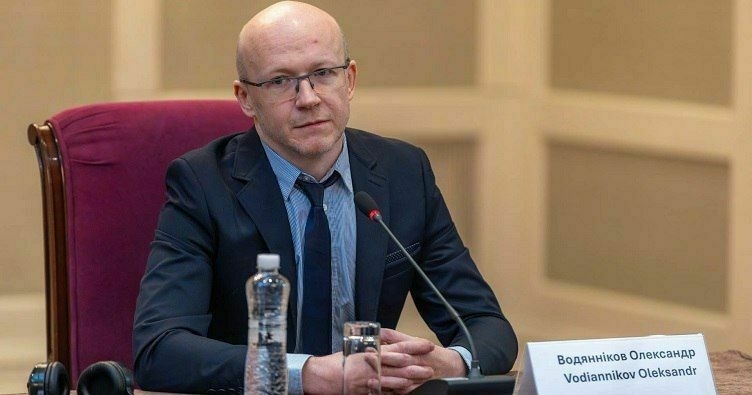
Oleksandr Vodiannikov, former coordinator of OSCE projects in Ukraine, now appointed as a judge of the Constitutional Court in an undated photo. (Telegram) The president has established an additional commission to re-verify candidates, which has already recommended three candidates for appointment. With one presidential appointment now made, one more appointment from the president remains necessary. At the same time, Vodyannikov's appointment demonstrates that progress is possible when political will exists.
This paralysis sends a troubling signal about Ukraine's commitment to European integration.
The Constitutional Court reform was not just another bullet point on a checklist, it was identified as the foremost priority among the seven key requirements for EU candidacy. By failing to implement this reform in practice, Ukraine risks undermining its credibility with European partners who have invested significant political capital in supporting Ukraine's membership bid.
This sends a particularly damaging message, given the current geopolitical context. While Ukrainian soldiers defend European values on the battlefield, the failure to appoint Constitutional Court judges suggests that the political elite may not be equally committed to defending those values through institutional reform.
This disconnect between wartime sacrifice and peacetime governance could prove costly for Ukraine's European aspirations.
The solution is straightforward: Parliament and the president must immediately appoint the vetted candidates recommended by the AGE.
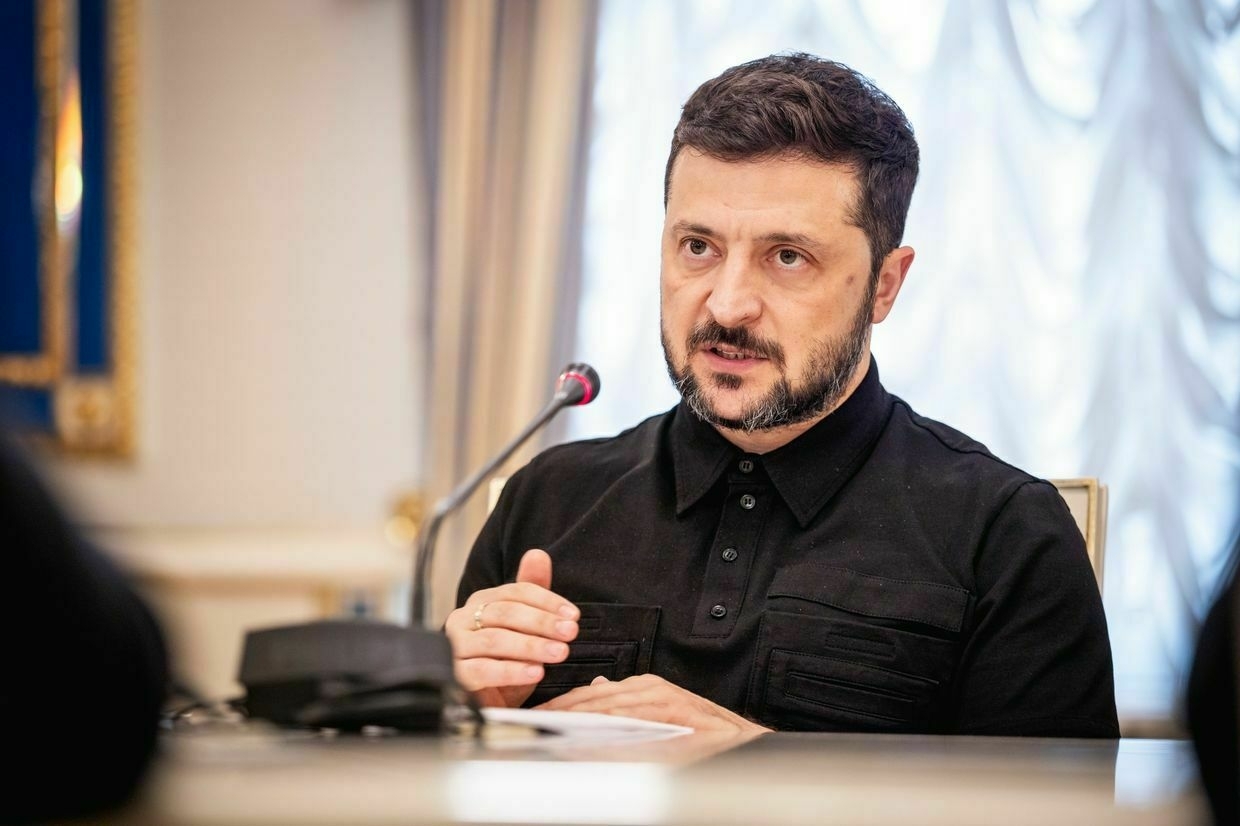
President Volodymyr Zelensky speaks to the media in Berlin, Germany, on June 30, 2025. (Juliane Sonntag / German Federal Foreign Office via Getty Images) This is not a complex legislative challenge requiring months of preparation, it is a simple matter of political will. The candidates have been thoroughly vetted by a process that Ukraine itself designed to meet European standards. Further delay only deepens the damage to Ukraine's international standing.
Completing these appointments would demonstrate that Ukraine's commitment to EU integration extends beyond rhetoric to concrete action. It would show that even during wartime, Ukraine can maintain and strengthen its democratic institutions. This is precisely the resilience and determination that will secure European support for Ukraine's membership bid.
Ukraine cannot afford to leave its Constitutional Court in limbo with a limited quorum. Every day without a functioning Court would be a day when citizens' constitutional rights go unprotected and when crucial wartime decisions would lack proper constitutional review.
Beyond these immediate concerns, however, there is a deeper question: Can Ukraine demonstrate the institutional maturity required for EU membership?
The appointment of Constitutional Court judges has become a litmus test for Ukraine's European future. It is time for Ukraine's political leadership to pass this test by completing the appointments without further delay.
The technical work is done, the candidates are ready, and the only missing element is the political decision. By taking this step, Ukraine would not only fill in the vacancies within the Constitutional Court but also reaffirm its unwavering commitment to the European path, proving that even in the darkest hours of war, Ukraine remains dedicated to building a democratic, law-binding state worthy of EU membership.
Ukraine’s tainted judges get a helping hand from law enforcement to stay in officeAs Ukraine struggles to reform its tainted judiciary, investigators and top officials are allegedly helping controversial judges to keep their seats. As part of the judicial reform, the High Qualification Commission was scheduled to vet 41 judges, including those from Ukraine’s two most dubious courts — the Pechersk Court and theThe Kyiv IndependentOleg Sukhov
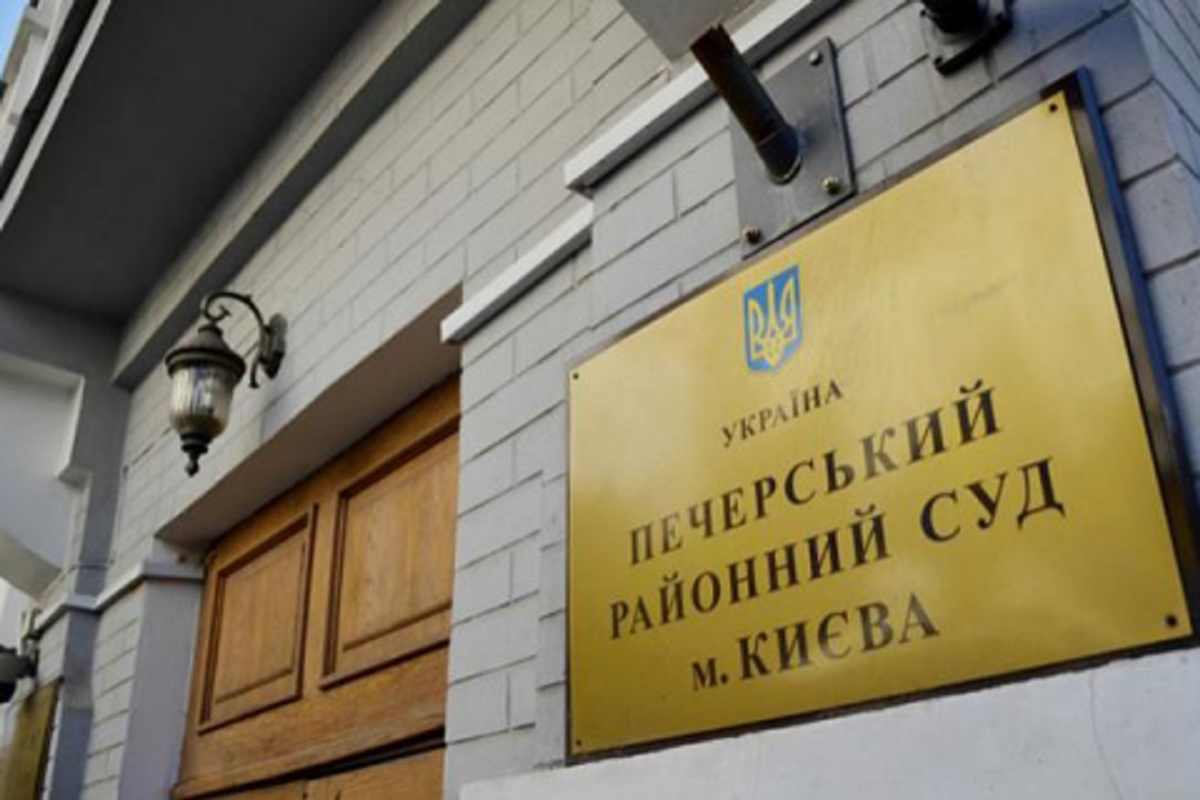
Editor’s Note: The opinions expressed in the op-ed section are those of the authors and do not purport to reflect the views of the Kyiv Independent.
-
2 people killed, 15 injured in Zhytomyr amid explosions
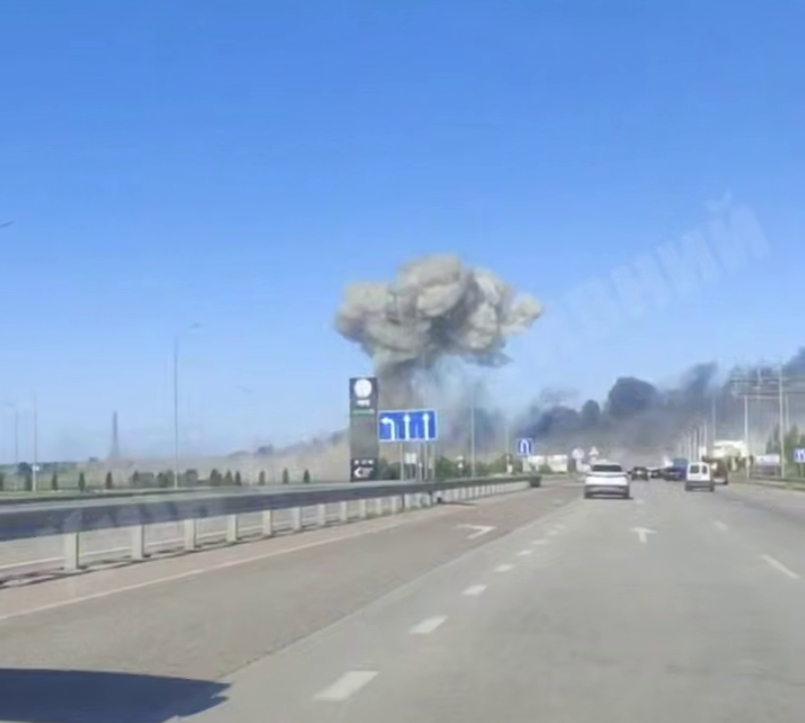
Editor’s note: This is a developing story and is being updated.
Two people have been killed and 15 others injured after explosions rang out beside a highway near the city of Zhytomyr, local officials reported.
The cause of the explosions was not immediately clear and is under investigation, Ukraine’s National Police said.
Zhytomyr City Council reported that the explosions occurred unspecified facility located close to the M-06 highway near Zhytomyr. Serhii Sokalskyi, head of the Hlubochytska community in Zhytomyr Oblast, claimed that the explosions may have rang out at an industrial warehouse near the town of Berezyna — although those details have yet to be confirmed.
Vitaliy Bunechko, head of the Zhytomyr Oblast Military Administration, said that multiple homes and powerlines had been damaged in the explosions, while also confirming the closure of the highway as the investigation carries on.
Videos of the explosions posted to social media show large clouds of smoke billowing out of the area of the explosions.
No information was provided on the status of the injured victims. Emergency responders are currently on-scene.
Located about 140 km west of Kyiv, Zhytomyr has become an occasional target of Russian missile and drone attacks. In recent months, Russia has intensified its attacks on Ukrainian cities, using upwards of 500 drones in attacks.
Despite the increase in attacks, support from Ukraine’s largest defense partner, the United States, has continued to wane. Politico reported on July 1, citing sources familiar with the matter, that the U.S. Defense Department (DOD) has halted shipments of some air defense missiles and other weapons previously promised to Kyiv out of concerns over the size of U.S. stockpiles.
Ukraine war latest: As Russia ramps up missile attacks, US halts promised air defense shipments to UkraineKey developments on July 2: * As Russia ramps up missile attacks, US halts promised air defense shipments to Ukraine * North Korea to send up to 30,000 more troops to aid Russia’s war against Ukraine, CNN reports * Ukraine denies another Russian claim of Dnipropetrovsk Oblast breakthrough, says small incursion repelledThe Kyiv IndependentThe Kyiv Independent news desk
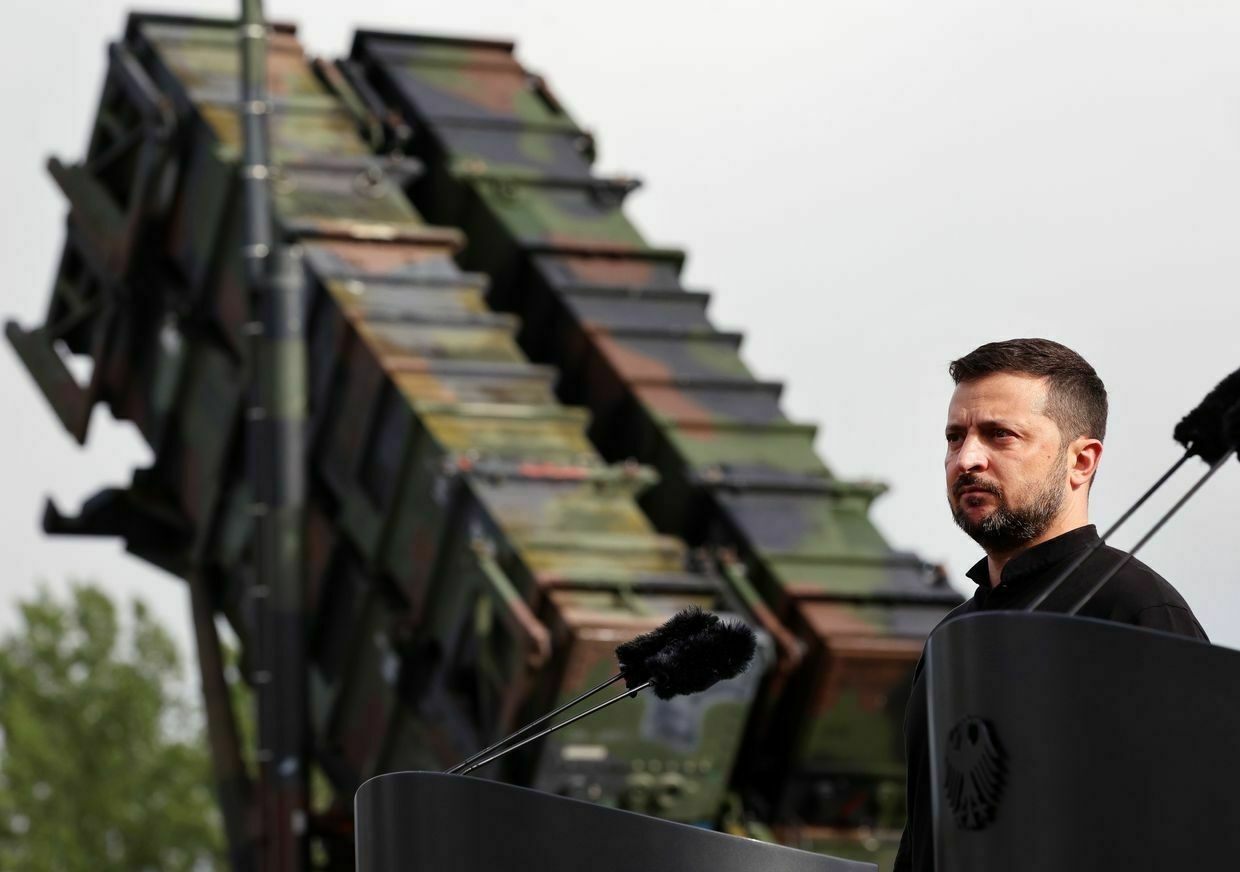
-
Ukraine war latest: As Russia ramps up missile attacks, US halts promised air defense shipments to Ukraine
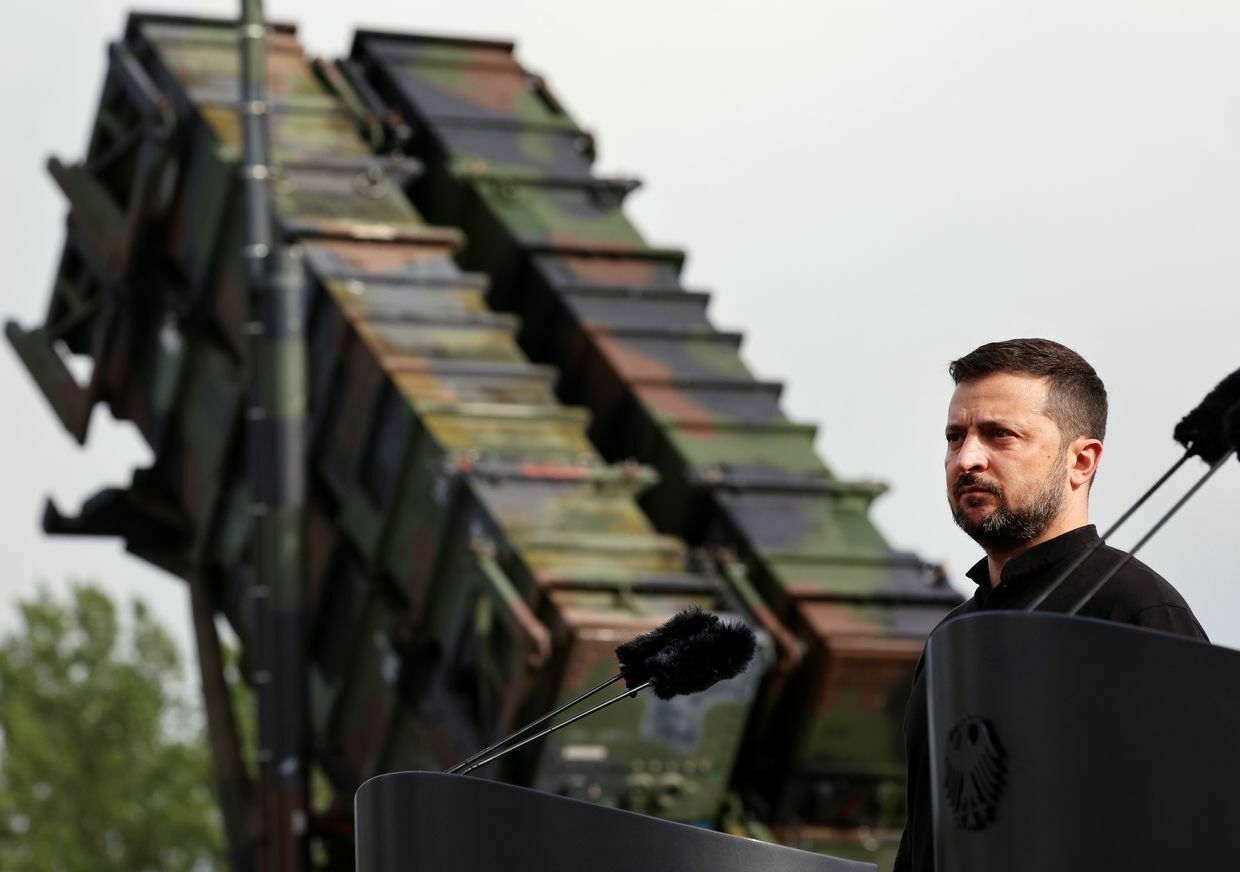
Key developments on July 2:
- As Russia ramps up missile attacks, US halts promised air defense shipments to Ukraine
- North Korea to send up to 30,000 more troops to aid Russia’s war against Ukraine, CNN reports
- Ukraine denies another Russian claim of Dnipropetrovsk Oblast breakthrough, says small incursion repelled
- Russia’s Kupol military plant reportedly halts operations after Ukrainian drone strike
- Russia killed at least 273 Ukrainian POWs during full-scale war, prosecutors say
The U.S. Defense Department (DOD) has halted shipments of some air defense missiles and other weapons previously promised to Kyiv out of concerns over the size of U.S. stockpiles, Politico reported on July 1, citing sources familiar with the matter.
The suspension comes as Ukraine faces a shortage of air defense munitions along with increasingly intense and deadly Russian bombardments. In June 2025, Russia launched 5,337 Shahed-type drones at Ukraine, shattering its previous monthly record.
Pentagon policy chief Elbridge Colby made the decision to pause the aid deliveries after conducting a review of U.S. munitions stocks, three sources told Politico. Colby was reportedly concerned about dwindling levels of artillery rounds, air defense missiles, and precision munitions.
Among the items being held back from Ukraine are Patriot air defense missiles, precision artillery rounds, Hellfire missiles, drones, and other missiles that Ukraine launches from F-16 fighter jets.
Colby made the decision in June, amid a surge in Russian mass aerial attacks against Ukraine. The White House later confirmed the pause.
The Pentagon’s decision “was made to put America’s interests first following a DOD review of our nation’s military support and assistance to other countries across the globe,” White House Deputy Press Secretary Anna Kelly said in a statement issued after Politico published the story.
“The strength of the United States Armed Forces remains unquestioned — just ask Iran,” she said.
Since his inauguration in January, U.S. President Donald Trump has not approved any additional military aid packages for Ukraine. Defense Secretary Pete Hegseth also announced recently that the U.S. will reduce the total aid it sends to Ukraine in its upcoming defense budget.
In his evening address on July 2, President Volodymyr Zelensky said Ukrainian and U.S. officials are working through the aid issue at a “working level,” including discussions on critical air defense support.
Ukraine’s Defense Ministry said it has not received any formal notification of delays or cancellations but has requested urgent consultations with U.S. defense officials.
The Foreign Ministry also summoned U.S. Charge d’Affaires John Ginkel, warning that “any hesitation” in military support would encourage further Russian aggression.
The Kremlin welcomed the decision, with spokesperson Dmitry Peskov saying, “The fewer weapons that are supplied to Ukraine, the closer the end of the (war)."
NATO Secretary General Mark Rutte expressed understanding of Washington’s desire to safeguard its stockpiles but said, “Ukraine cannot do without all the support it can get."
‘Major casualties among civilians’ — US freeze on air defense missiles is terrible news for UkraineThe halting of deliveries of air defense missiles from the U.S. will lead to“major casualties among civilians,” a deputy commander in Ukraine’s air defense told the Kyiv Independent. Politico reported on July 1 that the U.S. Defense Department (DOD) had halted shipments of some weapons previouslyThe Kyiv IndependentKollen Post
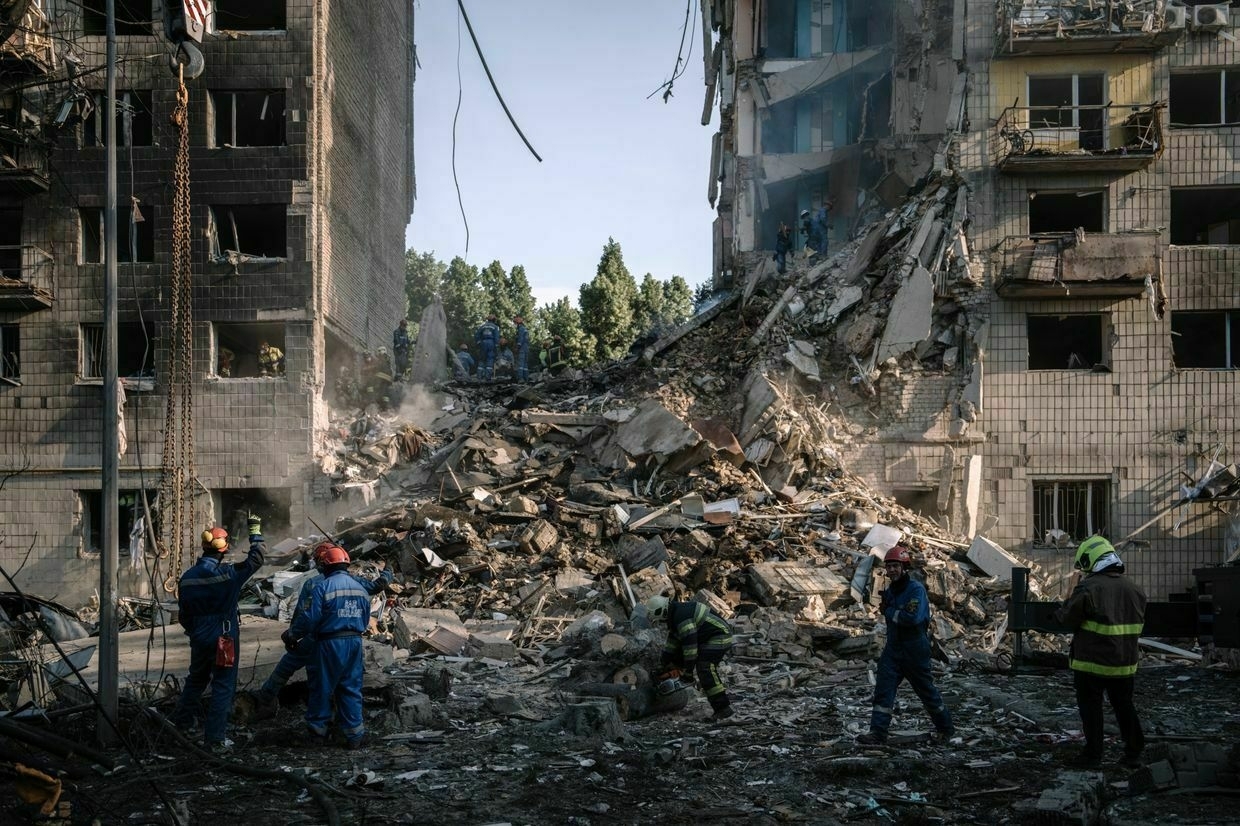
North Korea to send up to 30,000 more troops to aid Russia’s war against Ukraine, CNN reportsNorth Korea is preparing to set an additional 25,000-30,000 soldiers to join Russian forces fighting against Ukraine, almost three times as many as were dispatched last year, CNN reported on July 2, citing undisclosed Ukrainian officials.
The fresh units may arrive in the coming months and are likely to be engaged in combat in Russian-occupied Ukrainian territories, including during “large-scale offensive operations,” according to a Ukrainian military intelligence (HUR) assessment reviewed by CNN.
The news underscores North Korea’s growing involvement in the Russia-Ukraine war and the deepening military ties between Pyongyang and Moscow.
North Korea initially dispatched around 11,000 soldiers to Russia in the fall of 2024 to help fend off a Ukrainian incursion into Russia’s Kursk Oblast. According to various estimates, North Korean soldiers suffered between 4,000 and 6,000 casualties during this deployment.
Ukraine’s HUR also noted signs that Russian military aircraft are being refitted to transport North Korean troops from their homeland across Russia’s Siberia, CNN reported. Satellite imagery detected a ship involved in last year’s deployment at a Russian port and a cargo aircraft at North Korea’s Sunan airport, according to the outlet.
Estimates reported by CNN exceed those of South Korea’s intelligence, which expects Pyongyang to send an additional 15,000 soldiers to Russia as early as July or August.
Following his visit to Pyongyang in June, Russian Security Council Secretary Sergei Shoigu also announced that North Korea would send 1,000 sappers and 5,000 military engineers to Russia’s Kursk Oblast.
Pyongyang’s assistance to Russia has not been limited to troops, with North Korea being a key source of artillery shells and ballistic missiles for Russian forces.
Russian President Vladimir Putin and North Korean dictator Kim Jong Un signed the Comprehensive Strategic Partnership Agreement in Pyongyang in June 2024. Under the treaty, the two countries pledged to provide aid to one another if either is attacked.
While the countries initially denied involvement of North Korean troops in the Russia-Ukraine war, both Putin and Kim acknowledged the deployment earlier this year.
Arrests, raids, beaten and bloodied suspects — how Russia-Azerbaijan relations have unravelledDeaths in custody, media offices raided, and beaten and bloodied suspects paraded in court — relations between Russia and Azerbaijan, once considered close, have sharply deteriorated in recent days amid a series of high-profile incidents. The latest tensions erupted over the weekend when Russian law enforcement officers detained over 50 AzerbaijaniThe Kyiv IndependentTim Zadorozhnyy
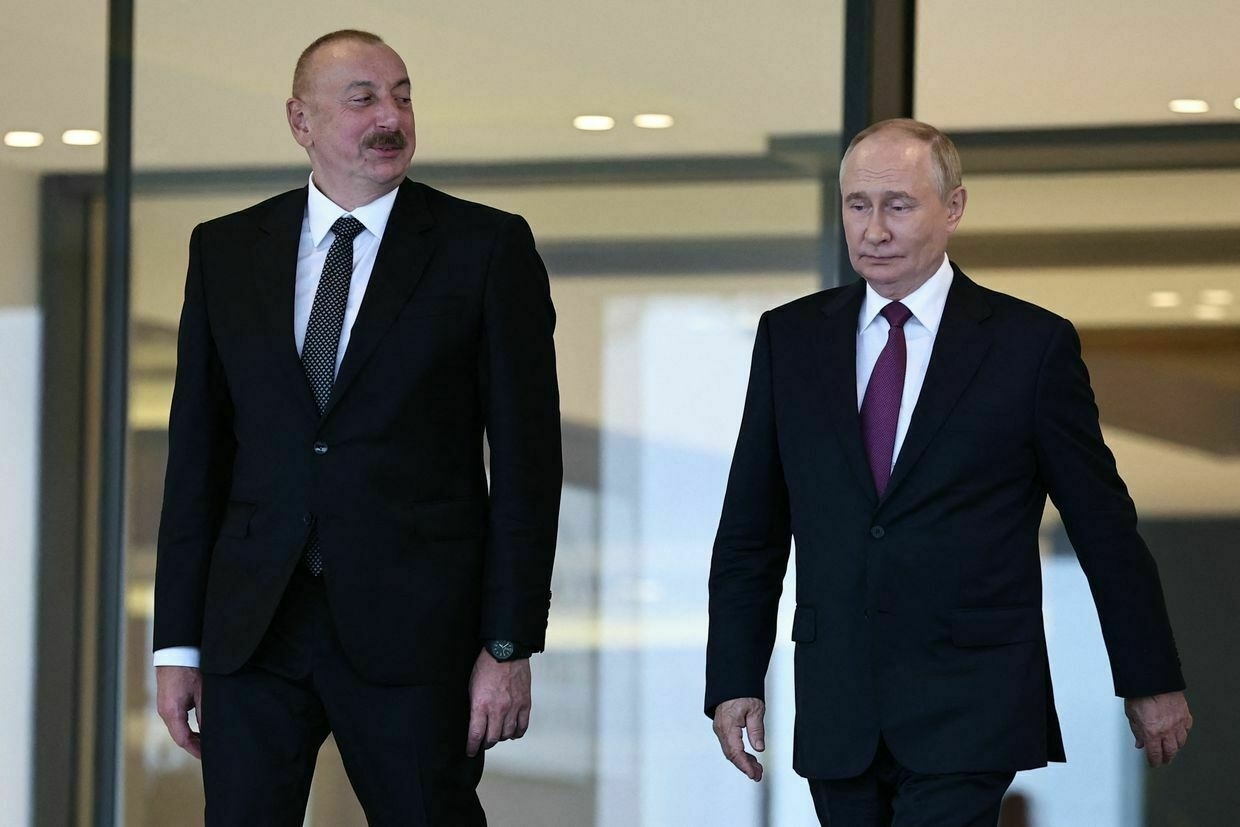
Ukraine denies another Russian claim of Dnipropetrovsk Oblast breakthrough, says small incursion repelledRussian forces have not succeeded in crossing into Dnipropetrovsk Oblast, Ukraine’s military said on July 2, refuting another Russian claim of a breakthrough into the central-eastern region.
The General Staff of the Armed Forces of Ukraine dismissed Russian claims of territorial gains as disinformation and said a recent small incursion was repelled.
According to the statement, a small Russian reconnaissance group managed to briefly enter the village of Dachne, located on the edge of Dnipropetrovsk Oblast. The group reportedly took photos with a Russian flag, but Ukrainian forces “eliminated them."
Russian troops have intensified efforts to breach the administrative border between Donetsk and Dnipropetrovsk oblasts in eastern Ukraine, but have failed to gain ground despite repeated assaults, the military said.
"(Russian troops) have had no success in achieving this demonstrative goal, no matter how many ‘meat wave assaults’ they launch with small infantry units and sabotage-reconnaissance groups,” the General Staff said in a statement.
Donetsk Oblast, which has been a focal point of Russia’s invasion since 2014 and a major battleground since the full-scale invasion in 2022, borders the more centrally located Dnipropetrovsk Oblast. Russian forces have not entered Dnipropetrovsk Oblast territory in force, although they regularly strike the region with missiles, drones, and aerial bombs.
In a separate incident, two Russian soldiers were captured during a subsequent assault on Dachne and are now in Ukrainian custody, the military said. They were detained by a unit of Ukrainian Marines and added to “Ukraine’s prisoner exchange pool."
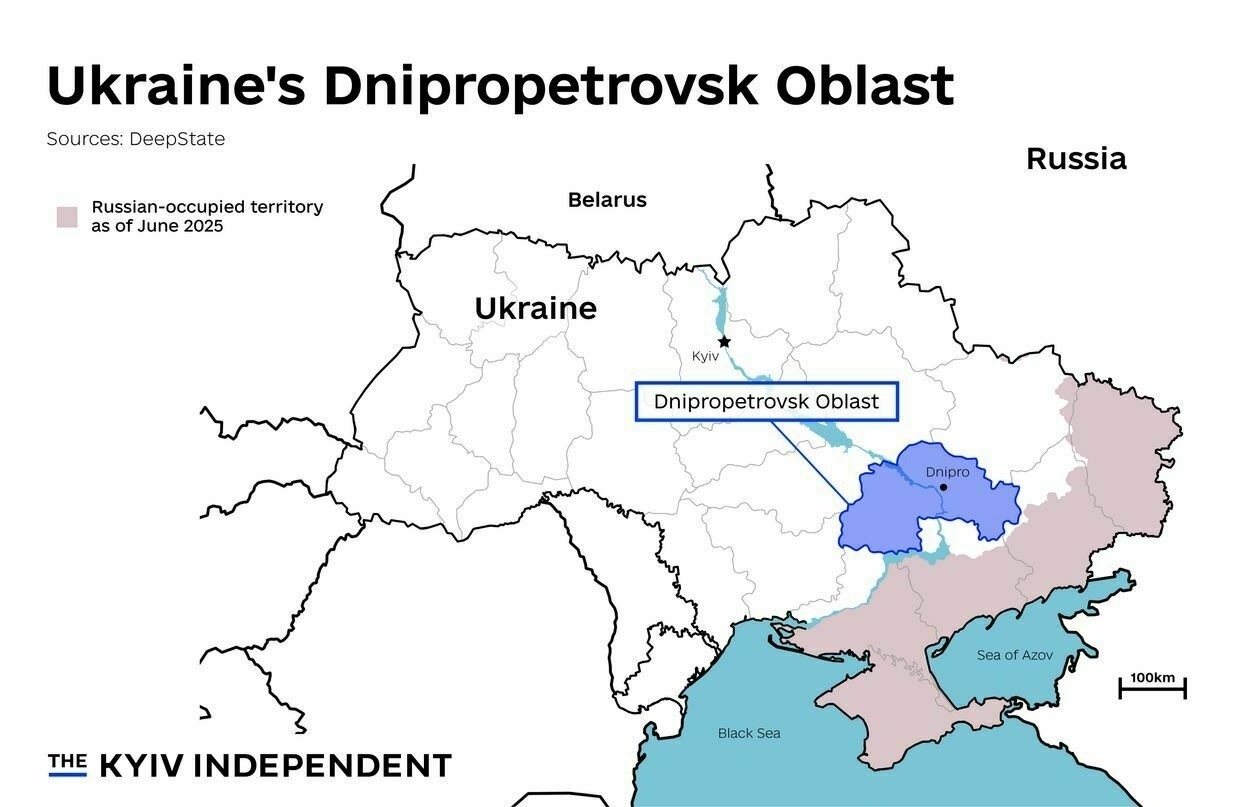
Ukraine’s Dnipropetrovsk Oblast (Nizar al-Rifai/The Kyiv Independent) “Therefore, the Russian propaganda about the seizure of the bridgehead in Dnipropetrovsk Oblast is not true. Dachne remains under the control of the Ukrainian Defense Forces,” the statement read.
The new claims echo a similar incident in May when Russian sources circulated a photo purporting to show Russian troops at the border of Dnipropetrovsk Oblast near the village of Novomykolaivka.
At the time, Ukrainian officials, including Dnipropetrovsk Oblast Governor Serhii Lysak, dismissed the photo as fake. The monitoring group DeepState later confirmed that the image had been taken in the village of Troitske in Donetsk Oblast and featured a Ukrainian vehicle abandoned under fire, which Russian forces later used for staged photos.
Russian forces have recently stepped up offensive operations across multiple sectors of the front line. Viktor Tregubov, spokesperson for Ukraine’s Khortytsia group of forces, said on June 16 that Moscow had increased attacks in the Novopavlivka sector.
Tregubov noted that the escalation near Novopavlivka indicates an effort to breach into Dnipropetrovsk Oblast. “But they have failed to succeed,” he said in a televised address.
Kremlin spokesperson Dmitry Peskov told Russian state-controlled media on June 9 that Russian forces were conducting operations in Dnipropetrovsk Oblast as part of efforts to create a so-called “buffer zone” on Ukrainian territory.
These remarks followed Russian President Vladimir Putin’s May 22 statement that Russia was working to establish a “security buffer zone” along the Ukrainian border regions of Kursk, Bryansk, and Belgorod.
Russia's Kupol military plant reportedly halts operations after Ukrainian drone strikeThe Kupol plant in Russia's Udmurt Republic ceased operations following a Ukrainian drone attack, independent media outlet Astra reported on June 2, citing emergency service sources.
Located more than 1,300 kilometers (800 miles) from the front line, the plant produces Tor and Osa air defense systems, as well as Harpy-type attack drones. It is under international sanctions as part of Russia's defense-industrial complex.
Two drones hit their intended targets during the strike with one flying through the windows of one workshop, and the second hitting the roof of another, causing an explosion and fire. The resulting blaze led to the collapse of 1,300 square meters of roofing, Astra reported.
Four workshops were destroyed in the first building of the complex, reportedly halting operations in areas responsible for metalworking, microchip soldering, and drone production.
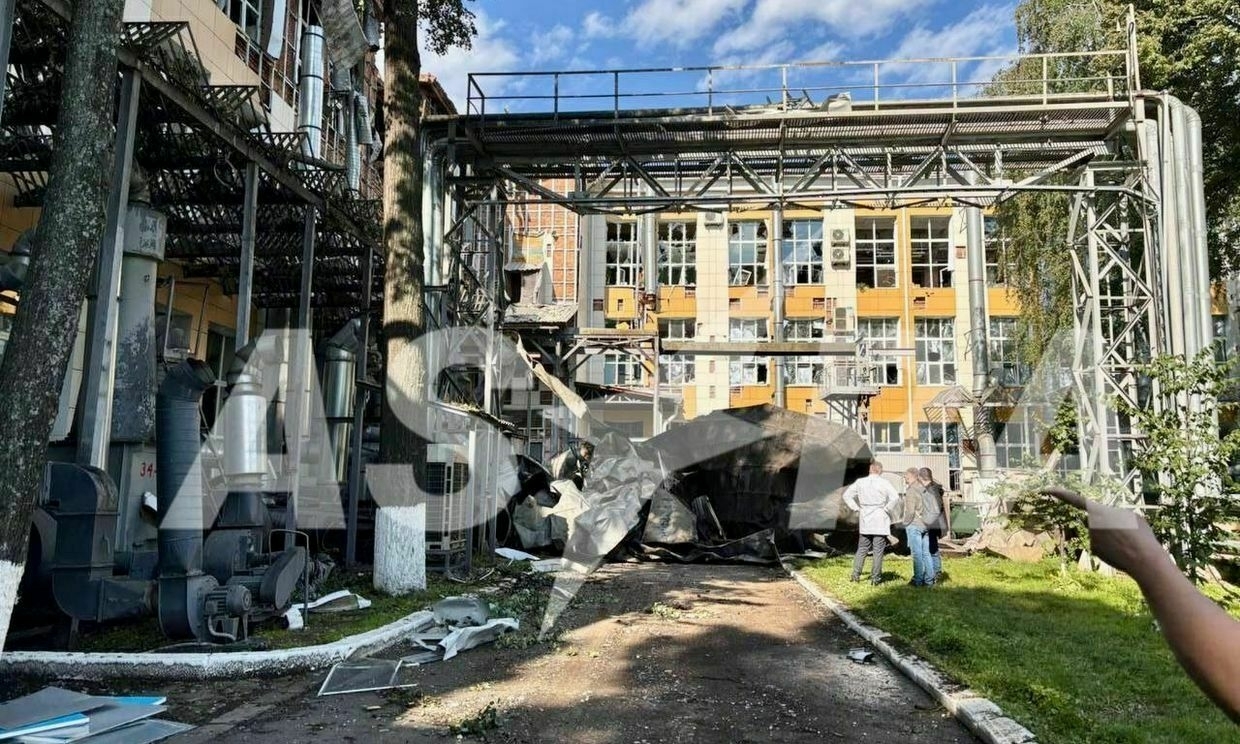
The consequences of a Ukrainian drone strike on the Kupol plant in Russia's Udmurt Republic, published on June 2, 2025. (Astra / Telegram) Udmurt Republic Governor Alexander Brechalov said on June 1 that three people were killed and 45 injured in the attack, including 35 hospitalizations and six in serious condition.
Astra earlier reported that no air raid siren was issued in Izhevsk ahead of the attack. Residents claimed to be unable to receive emergency alerts due to persistent mobile internet outages.
Ukraine's General Staff confirmed the strike via its official Telegram channel, framing it as part of Kyiv's campaign to degrade Russia's defense-industrial base far from the front.
The plant was previously targeted in a Ukrainian drone strike on Nov. 17, 2024. That attack damaged equipment used to produce Tor missile systems and radar components.
Izhevsk, the capital of the Udmurt Republic, is known as a center of Russia's arms manufacturing industry and the birthplace of the Kalashnikov rifle.
The latest attack underscores Ukraine's capacity to strike deep into Russian territory.
Russia increasingly targets Ukraine’s cities with cluster munitions, raising civilian tollAmid stalled peace talks, Russia is increasingly attacking Ukrainian cities with cluster munitions, banned by international organizations for the indiscriminate damage they cause to civilians. The civilian casualty toll in Ukraine in 2025 rose by 37% compared with the same period last year, mostly due to Russia’s use ofThe Kyiv IndependentNatalia Yermak
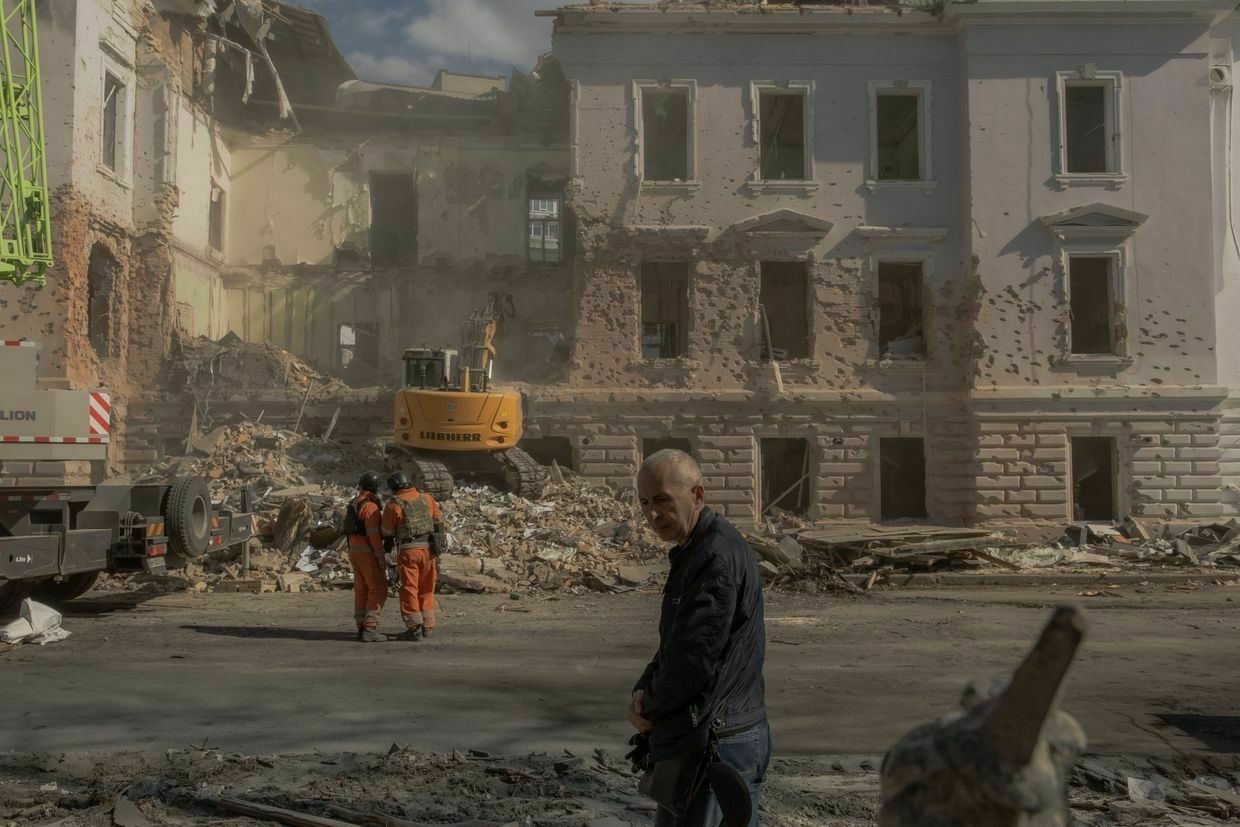
Russia killed at least 273 Ukrainian POWs during full-scale war, prosecutors sayUkrainian prosecutors have documented cases of Russian forces summarily executing 273 Ukrainian prisoners of war (POWs), the Liga.net news outlet reported, citing a statement from the Prosecutor General's Office.
Kyiv and the UN have raised alarm over the rising number of such cases, saying they point to a systematic policy by Russia to murder Ukrainian captives. Half of the document cases were recorded this year alone.
Seventy-seven criminal cases have been launched in connection with the killings of POWs, while only two people were convicted, and a trial against a third person is ongoing. The statement did not clarify whether the convictions were issued in absentia.
A total of 188 people have been convicted of various war crimes, including 18 captured Russian soldiers and one civilian, who were convicted in person. The rest were convicted in absentia.
Earlier this week, Ombudsman Dmytro Lubinets reported a case of the likely murder of a Ukrainian POW who was apparently tied to a motorcycle by Russian soldiers and dragged along the road.
Ukraine's military intelligence agency (HUR) said in May that it alone had documented more than 150 cases of Ukrainian soldiers being executed after surrendering to Russian forces. Multiple intelligence reports suggest that Russian soldiers have received explicit orders to kill prisoners of war.
The United Nations Independent International Commission of Inquiry on Ukraine confirmed in March growing numbers of incidents in which Russian forces killed or maimed surrendering Ukrainian troops.
A separate Ukrainian investigation is also underway into the killing of around 50 Ukrainian POWs in the Russian-run Olenivka prison in 2022. Kyiv blamed the killings on Russia, saying Moscow's forces deliberately put Azov fighters in a separate building that was later destroyed.
Russia denied responsibility, claiming the explosion was caused by a Ukrainian HIMARS strike — a version UN investigators have rejected.
Although Moscow blocked an independent investigation by denying UN monitors access, Lubinets recently said that an internal UN analysis concluded Russia was to blame.
Note from the author:
Ukraine War Latest is put together by the Kyiv Independent news desk team, who keep you informed 24 hours a day, seven days a week. If you value our work and want to ensure we have the resources to continue, join the Kyiv Independent community.
-
Over 210,000 Russians sign contracts for war in Ukraine in first half of 2025, Moscow says
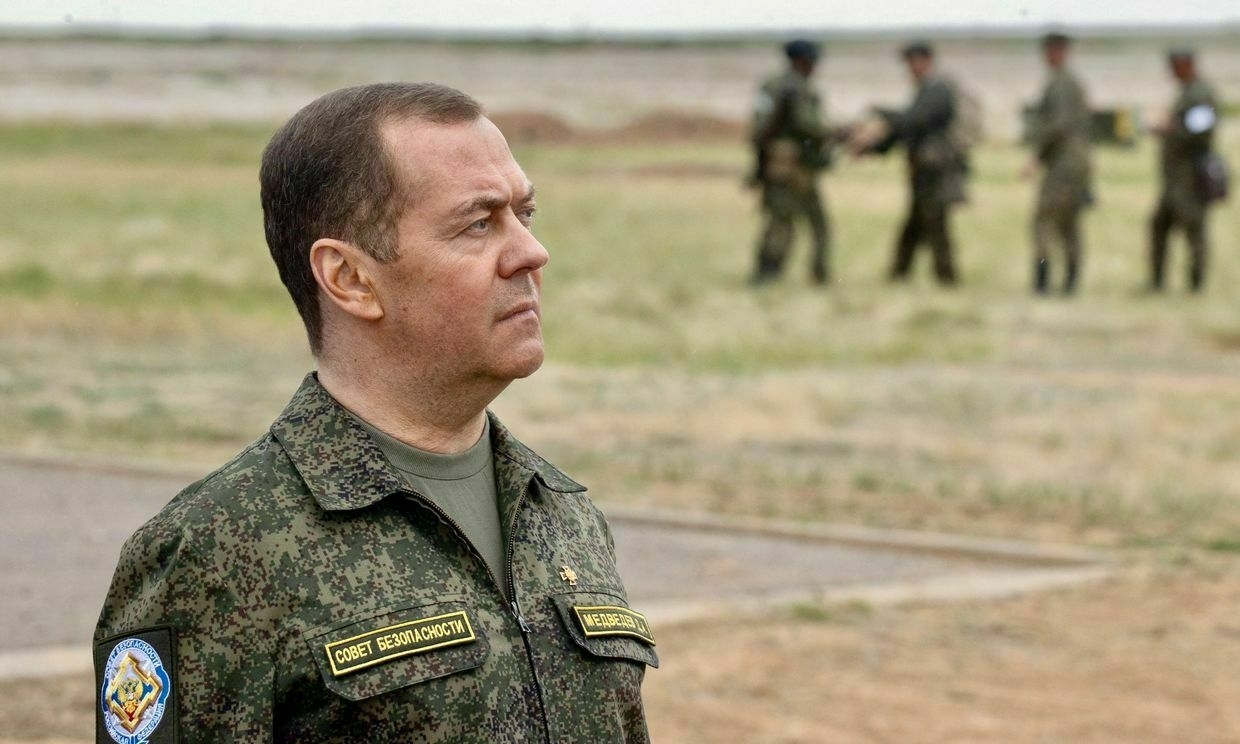
More than 210,000 Russians signed contracts with the Defense Ministry from January to July 2025 to fight in Ukraine, Dmitry Medvedev, the deputy chairman of Russia’s Security Council, said on July 2.
“The pace is quite decent, good,” Medvedev said at a meeting of the commission on Armed Forces staffing. “I hope that we will be able to maintain the same momentum in the future."
An additional 18,000 individuals have joined volunteer units, Medvedev added.
The revelation comes as Russia continues to escalate its war effort despite repeated calls from Ukraine, the U.S., and European partners for an unconditional ceasefire.
According to Western and Ukrainian intelligence cited by the Wall Street Journal, Russian forces recruit 30,000 to 45,000 new troops monthly — nearly twice the rate of Ukraine’s mobilization, which President Volodymyr Zelensky said stands at 25,000–27,000 troops per month.
Ukraine estimates that Russia has suffered nearly 1 million casualties since the full-scale invasion began in February 2022. However, Moscow has offset its losses through aggressive recruitment and a steady influx of contract soldiers.
In late 2024, Russian President Vladimir Putin signed a decree increasing the size of the Armed Forces to 2.38 million personnel, including 1.5 million military service members.
Russia also this year launched its largest conscription drive in 14 years, aiming to enlist 160,000 men for mandatory service. The country holds two annual conscription campaigns, in spring and fall, requiring one year of service from eligible men.
While conscripts are not typically deployed to combat zones, the Kremlin has leaned on financial incentives and promises of pardons to recruit civilians and former inmates for its war.
Following the deeply unpopular partial mobilization of September 2022, which triggered an exodus of over 261,000 Russians, Moscow has avoided mass drafts, relying instead on contract-based service.
‘Major casualties among civilians’ — US freeze on air defense missiles is terrible news for UkraineThe halting of deliveries of air defense missiles from the U.S. will lead to“major casualties among civilians,” a deputy commander in Ukraine’s air defense told the Kyiv Independent. Politico reported on July 1 that the U.S. Defense Department (DOD) had halted shipments of some weapons previouslyThe Kyiv IndependentKollen Post
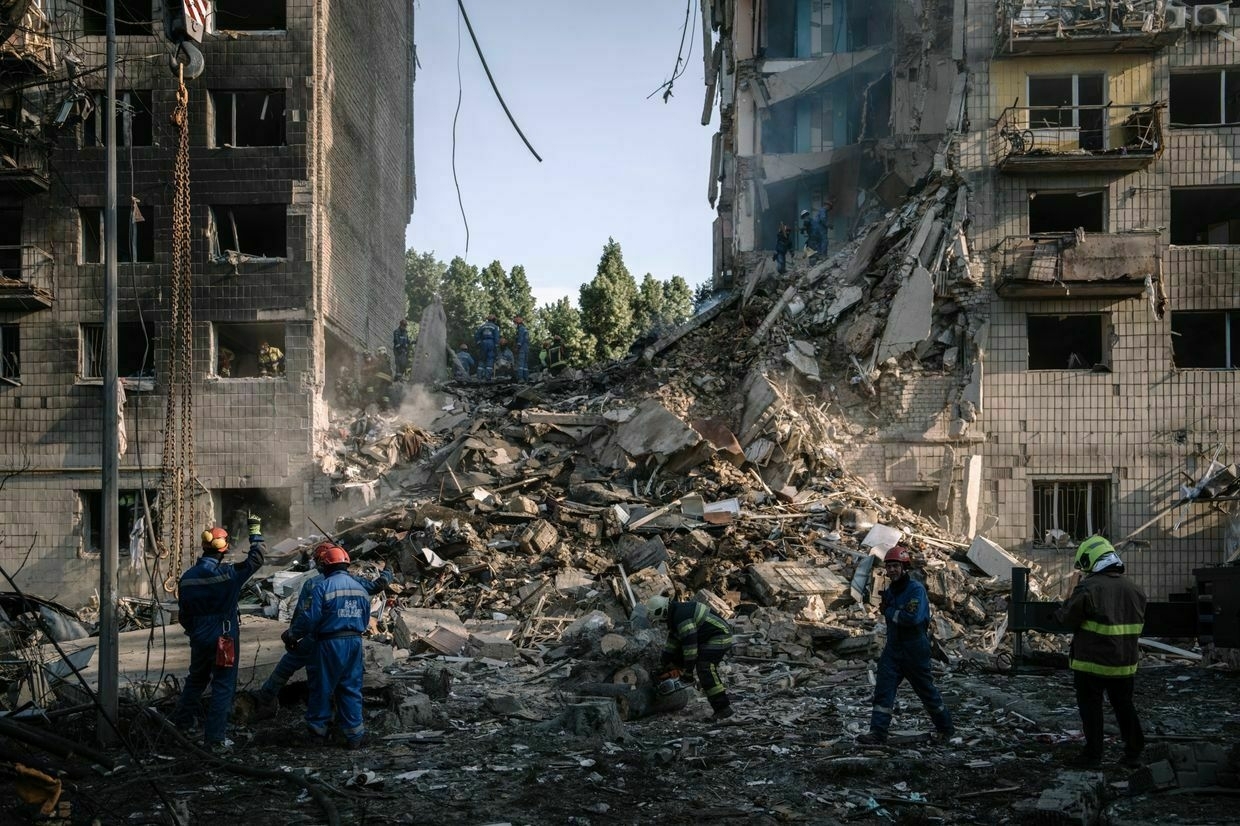
-
Arrests, raids, beaten and bloodied suspects — how Russia-Azerbaijan relations have unravelled
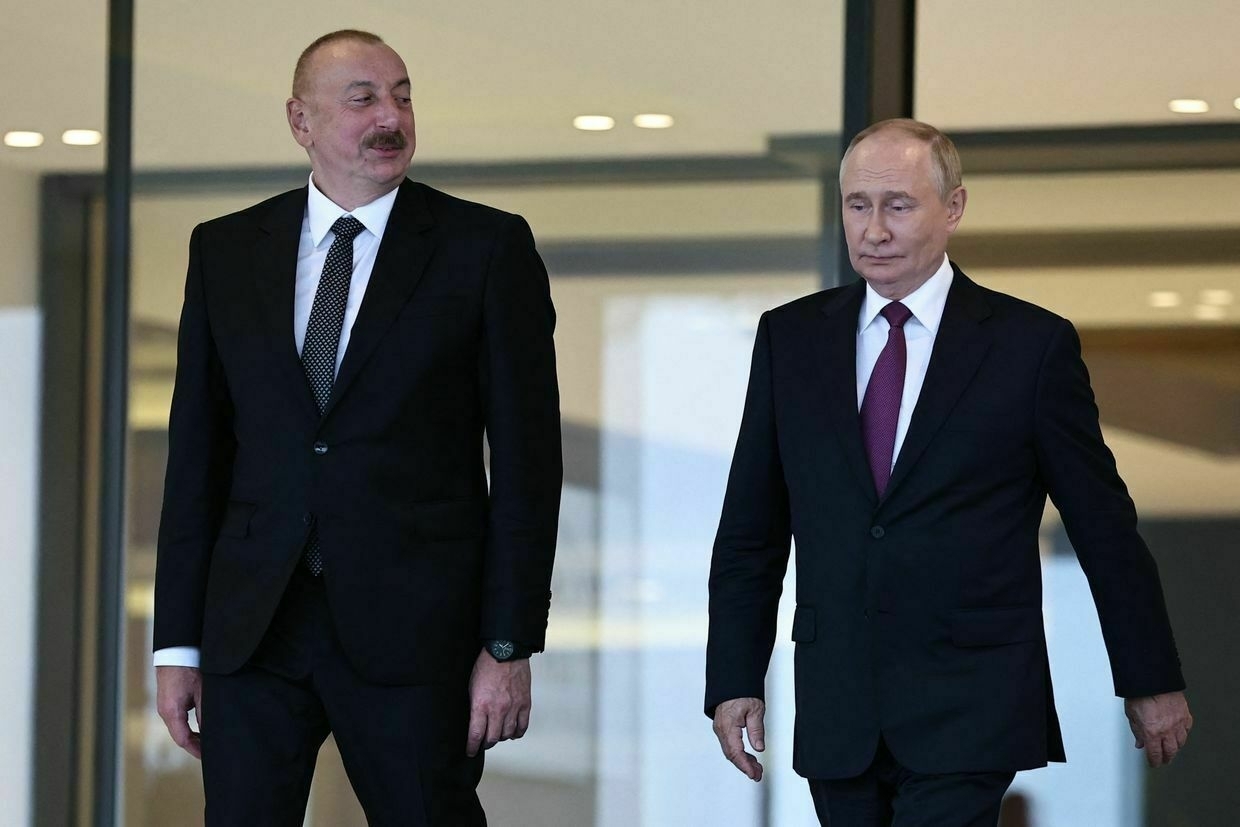
Deaths in custody, media offices raided, and beaten and bloodied suspects paraded in court — relations between Russia and Azerbaijan, once considered close, have sharply deteriorated in recent days amid a series of high-profile incidents.
The latest tensions erupted over the weekend when Russian law enforcement officers detained over 50 Azerbaijani nationals in Yekaterinburg, Russia, as part of an investigation into a murder case from 2001.
Two men — brothers Ziyaddin and Huseyn Safarov — were killed during the operation, and several others were injured.
The incident prompted a sharp response from Baku.
On June 28, Azerbaijan’s Foreign Ministry released a statement describing the killings as “ethnically motivated public and deliberate unlawful actions,” adding that Russia’s actions have “recently taken on a systematic nature."
The incident is just the latest development in a years-long reshaping of the geopolitical landscape in the South Caucasus. Azerbaijan, Armenia, and Georgia were all Soviet republics, and Russia still views the region as its own backyard.
But Russia’s hold and influence over them has been challenged, a process which began before the full-scale invasion of Ukraine and has continued to pick up speed in the following nearly three and a half years.
Moscow’s relationship with Baku has been particularly complex. Vadim Dubnov, a columnist for Radio Free Europe/Radio Liberty’s Echo of the Caucasus project, told the Kyiv Independent that the latest confrontation is part of a broader and long-running shift in the bilateral relationship.
“The deterioration of relations was systemic,” he said.

A view shows the main newsroom of Sputnik news, part of the state-run media group Russia Today, in Moscow, Russia, on April 27, 2018. (Mladen Antonov / AFP via Getty Images) Russia’s decreasing clout
Before 2020, Russia’s closest ally in the region was Armenia, which had been locked in a decades-long, on-off conflict with Azerbaijan over the disputed region of Nagorno-Karabakh.
But after Russian “peacekeepers” failed to act in either the Second Karabakh War in 2020 or the Azerbaijani lightning offensive in 2023, both of which saw Azerbaijan reclaim its lost territory, this relationship soured greatly.
“Armenia has realized that its only security guarantee is not Russia but peace with its neighbors,” Dubnov said.
Buoyed by its military success, Azerbaijan has been seeking to reassert influence over the region and redefine its relationship with Moscow.
“After the Karabakh war, I think (Azerbaijan President Ilham) Aliyev may have believed that he had obtained everything he could from Moscow,” Dubnov said.
Armenia, which has lambasted Moscow for failing to help it during the Nagorno-Karabakh conflict, was now drifting closer to the West.
Armenian Prime Minister Nikol Pashinyan has suspended the country’s membership in a Russian-led Collective Security Treaty Organisation (CSTO) military alliance and announced plans to join the European Union. Recently, there has also been a crackdown on the pro-Russian opposition in Armenia.
As Russia is losing its grip over Armenia and Azerbaijan, the only country in the region where its influence remains strong is Georgia.
Dubnov said that Russia’s position in the South Caucasus is weaker now, and Turkey, an ally of Azerbaijan, has emerged as a major regional player.
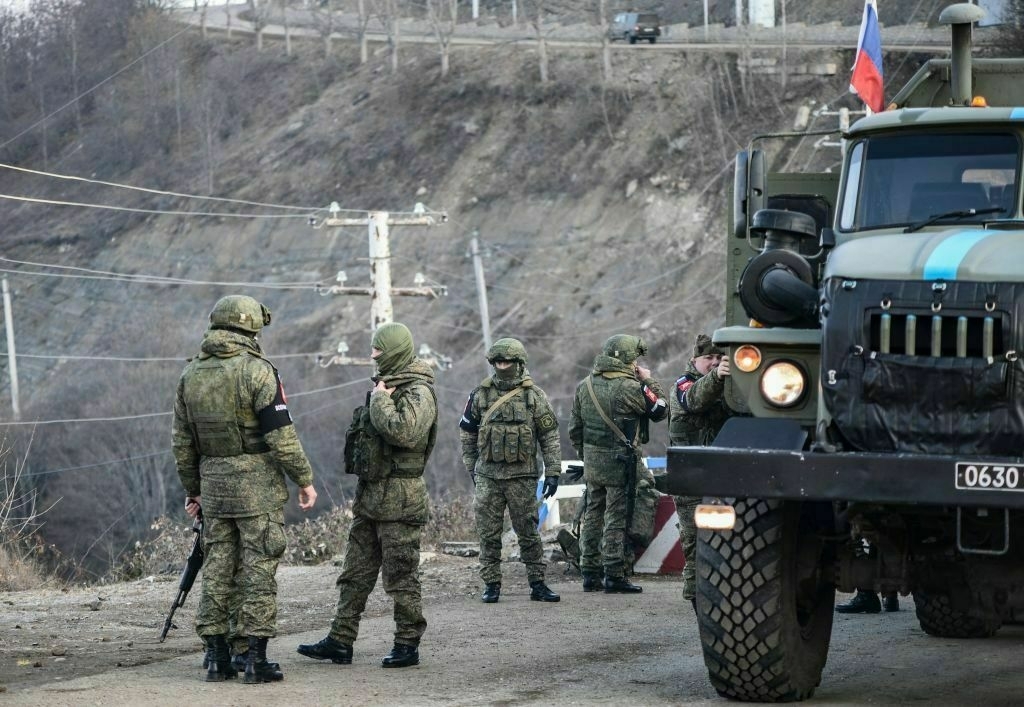
Russian soldiers are deployed at the Lachin corridor, Nagorno-Karabakh region’s only land link with Armenia, in Nagorno-Karabakh, on Dec. 26, 2022. (Tofik Babayev / AFP via Getty Images) Russia-Azerbaijan tensionsWhile recent incidents have brought tensions into the open, analysts say the rupture reflects a longer, structural shift in Azerbaijan’s foreign policy.
Dubnov described the shift as “systemic and inevitable,” pointing to a gradual breakdown since Russia’s annexation of Crimea in 2014 and the beginning of its war in eastern Ukraine.
“Azerbaijan was quite seriously concerned about its northern borders and the possibility of Moscow’s influence on national minorities,” Dubnov said.
Dubnov said Baku’s moves should not be seen purely as a pivot away from Moscow, but as an effort to restore geopolitical balance.
“Aliyev began to improve relations with the West, especially after (U.S. President Donald) Trump returned to the White House, and to restore this balance,” he said.
“So, it’s not so much about worsening relations with Russia or moving away from Russia, but about restoring that balance. And now there is simply a greater distance between the two."
But as this distance increases, it’s presenting itself in ever more dramatic fashion in what appears to be a series of tit-for-tat actions.
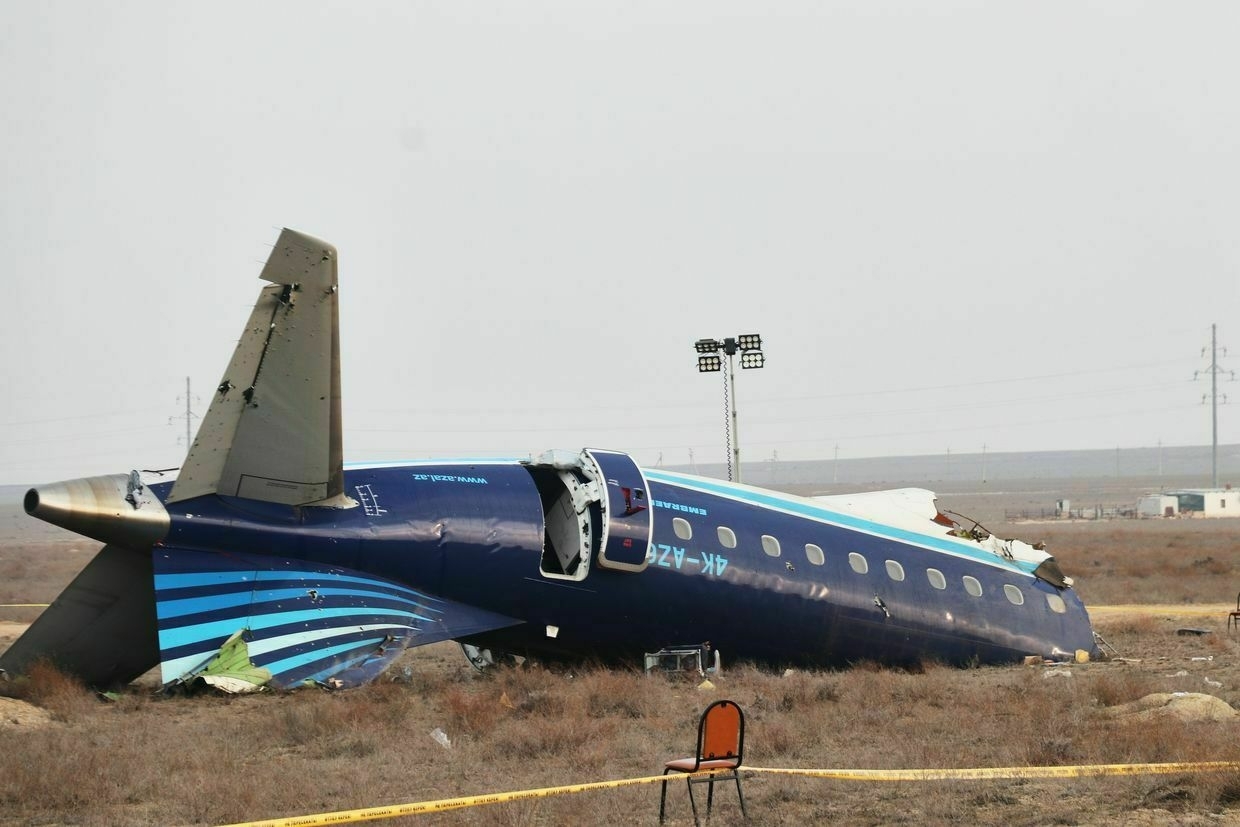
Evidence collection efforts at the crash site of an Azerbaijan Airlines (AZAL) passenger plane near Aktau, Kazakhstan, on Dec. 27, 2024. (Meiramgul Kussainova/Anadolu via Getty Images) Crash of AZAL airlinerThe current deterioration goes back further than just this weekend and has its roots in a tragedy late last year when a Russian air defense system shot down an Azerbaijani passenger plane.
The aircraft en route from Baku to Grozny in Russia’s Chechen Republic suddenly changed course and crashed near Aktau, Kazakhstan, on Dec. 25, 2024, killing 38 people out of 67 on board.
While Russian President Vladimir Putin called Aliyev shortly after the incident to offer condolences, he did not take responsibility for the crash.
Aliyev later criticized Russia’s handling of the incident, accusing its agencies of suppressing evidence and spreading “absurd versions” of what happened.
Dubnov noted that while the incident was not the origin of the diplomatic rupture, it served as a catalyst.
“The story with the plane was not the primary issue,” he said. “It was not the beginning of the quarrel, but rather an opportunity for Baku to start, legalize, and formalize this quarrel."
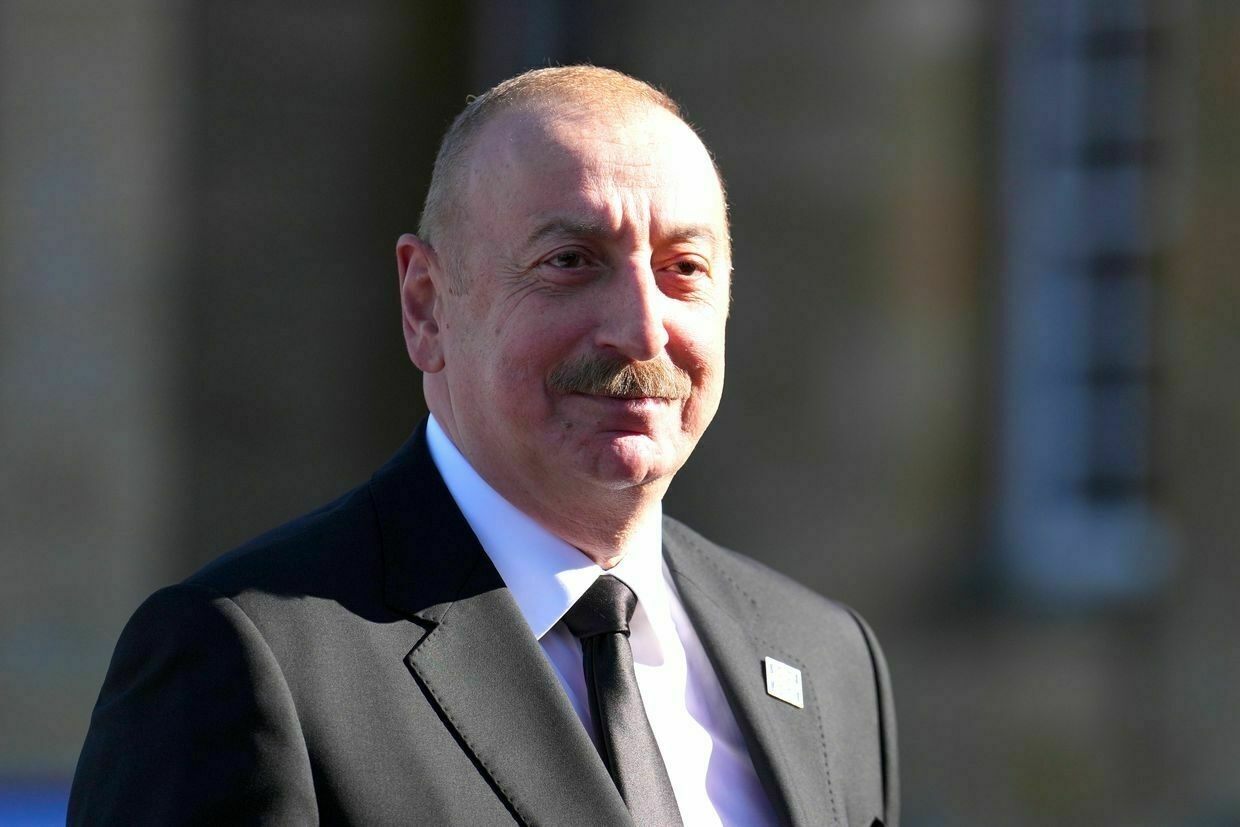
President of Azerbaijan Ilham Aliyev talks to the press at the European Political Community Summit in Woodstock, England, on July 18, 2024. (Carl Court / Getty Images) Aliyev’s Moscow parade tripThe fallout from the plane crash spilled over into symbolic diplomacy.
In March, both Russian and Azerbaijan confirmed that Aliyev had accepted an invitation to attend Russia’s May 9 Victory Day parade in Moscow — a significant gesture, as he had last attended in 2015.
But just days before the event, Aliyev abruptly canceled his trip without explanation.
Dubnov said the decision sent a clear message.
“I think that after Aliyev didn’t come to Moscow on May 9, it became clear that there would be no apology for the downed plane,” he said.
“No one expected a direct apology. What everyone was really waiting for was a form of compromise that could substitute for one."
Dubnov added that Aliyev’s no-show served as a signal to Moscow that “no improvement in relations was coming — at least not publicly."
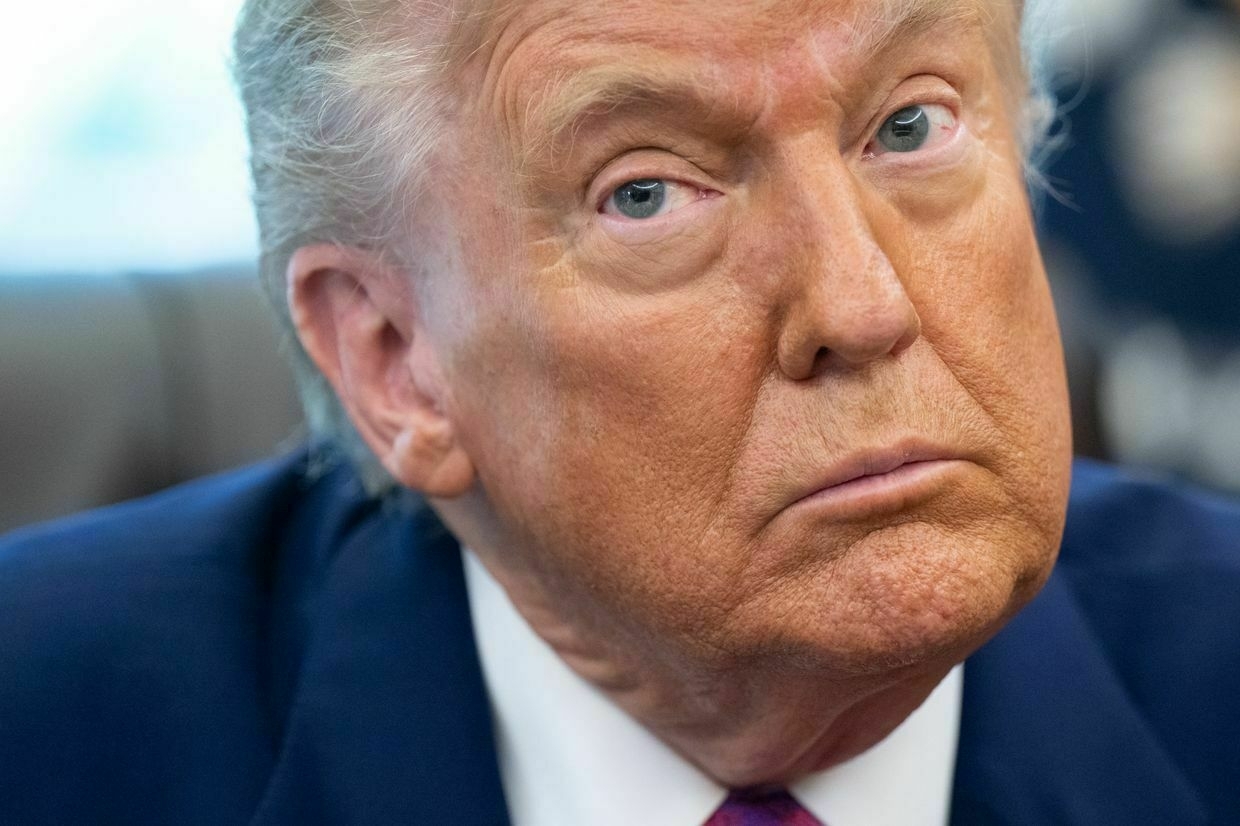
U.S. President Donald Trump at the White House in Washington, DC, U.S. on June 10, 2025. (Saul Loeb / AFP via Getty Images) The current situation
Tension has simmered since May 9 and erupted in recent days with the deaths in Yekaterinburg over the weekend, with Azerbaijan’s reaction going well beyond just official statements.
The government canceled all Russian-organized events scheduled to take place across Azerbaijan. A planned visit by a parliamentary delegation to Moscow was also suspended.
The diplomatic rupture escalated further on June 30, when Azerbaijani police raided the Baku offices of Sputnik Azerbaijan, a Russian state-controlled media outlet that operates as one of the Kremlin’s main propaganda tools.
Several employees were detained, with Azerbaijani authorities claiming two of the individuals arrested were operatives of Russia’s Federal Security Service (FSB).
Among the detainees were Sputnik Azerbaijan’s chief editor, Igor Kartavykh, and managing editor, Yevgeniy Belousov. In response, the outlet called the allegations “absurd."
Russia retaliated by summoning Azerbaijani Ambassador Rahman Mustafayev to the Foreign Ministry on July 1, where he was informed of Moscow’s formal protest over Baku’s “unfriendly steps and deliberate measures to dismantle relations with Moscow."
A day later, Azerbaijan arrested eight Russian citizens described as “members of two organized crime groups” accused of cybercrimes and smuggling drugs from Iran.
They were presented in court handcuffed, bruised, and bloodied.
Arrested Russian citizens as they appeared in a Baku court. What a grim statement by Aliyev.
— Leonid Ragozin (@leonidragozin) July 1, 2025
Meanwhile, Russian law enforcement agencies are arresting Azeri diaspora leaders across the country, specifically targeting owners of large markets allegedly controlled by ethnic… pic.twitter.com/iiFAbHKHKvReflecting on the sharp escalation in tensions — from deadly detentions to the raid on Sputnik's bureau — Dubnov suggested that while the fallout appears serious, it is unlikely to result in a full diplomatic rupture.
"So I believe this will last for a while — not just a few days, but perhaps a few weeks — yet I don't think it will lead to anything truly consequential," he said.
Note from the author:
Hi, this is Tim. Thank you for reading this article. The Kyiv Independent doesn't have a wealthy owner or a paywall. Instead, we rely on readers like you to keep our journalism funded. If you liked this article, consider joining our community today.
Ukraine’s new interceptor UAVs are starting to knock Russia’s long-range Shahed drones out of the skyRussia’s Shahed drone swarms are pummeling Ukraine on a nightly basis, inflicting ever more death and destruction in cities that had managed to carve out some sense of normalcy amid wartime. Civilian alarm has grown. With traditional air defense stockpiles running low, the government is banking on newly createdThe Kyiv IndependentKollen Post
